#parallel narratives where in one the character is experiencing a half-life and its making my chest hurt
Explore tagged Tumblr posts
Text
reading a book and thinking of someone is insane. worse if its someone you used to know. even worse somehow if its someone you wish you knew. do you write like this? do you think like this? do you feel like this? can i hold you like this?
#much to consider#anyway reading this book thats like. so grief-soaked.#parallel narratives where in one the character is experiencing a half-life and its making my chest hurt#and in the other shes living whole and unencumbered and its making my chest hurt bc it reminds me IM living a half-life. okay 👍
2 notes
·
View notes
Text
All of this is very true and correct. On the lore keeping side of things, it’s heavily implied to have only been a year by the time book 5/6 rolled around. Between Veronica’s new alt not looking too much older and that line from the tempest trials basically confirms it.
Now, in my personal opinion, this feels incredibly wrong.
Unlike any other fire emblem game, FEH has the unique structure of being serialized. We have spent a LONG time with these characters. Seven years, if you’ve been here since the beginning. That gives Heroes a fascinating and unique emotional base to play off of for its narrative.
Normally, when a FE game says these characters have been fighting side by side for a long time, the audience has to extrapolate what that means for themselves. For example, how long is the first half of FE: Awakening? How much time has passed since Robin woke up in a field to defeating Gangrel? To my knowledge, we have no clue. The most solid timeframe that FE: Awakening provides is the two year time skip and Lucina being from over ten years in the future. And this is not a criticism of Awakening; it doesn’t really need to convey that information. It might be nice for the characterization of Robin, but at the same time, knowing the exact number doesn’t rob the effect of his arc defying the ancient immortal Grima with infinitely more memories than him. Then, on top of this, the undefined amount of time that has canonically passed and the time the player spends experiencing the game never coincide with one another. Intelligence systems could say defeating Gangrel took the length of a summer, and that wouldn’t affect the player who took a year to finish it or the player who beat it in a week. Because we know how the audience temporally experiences it isn’t as baked into its structure. If we were given a solid timeline, we wouldn’t really be primed to care.
FEH does not operate in this way. Again, it's serialized. The time taken to engage with it's narrative is controlled. And this is a boon for it’s narrative more often than not. For example, what makes Alfonse’s, “...when you’re not near, I feel… not quite myself,” line effective? Especially as time goes on? There’s many reasons, especially since this is a character growth moment. But I’d argue one of them is how we intrinsically understand what he means, because we have witnessed these characters going on adventures with each other for YEARS. By now, we can imagine everyone in our core four cast feels something akin to that about each other. Alfonse, Sharena, Anna, and Kiran have all literally and metaphorically walked through hell and back together multiple times over. How can he not feel that way about them at this point? It’s been seven years.
That has the potential to be a deeply compelling, no? All it needs is to be purposely applied. So whenever I take it upon myself to fill in the gaps of its narrative, I enjoy using the passage of time to further communicate the bonds between these characters. Because we are in a rare scenario where the audience has already been primed to feel something when a specific time frame is mentioned. I can make Bruno’s tragedy of a life hurt more by emphasizing just how young he was when his life started falling apart and have it parallel how vulnerable Veronica is now. We can now understand why he’s trying to stand by her despite the curse making his life a living hell. Anna also makes a lot more sense as a character if she’s been fighting on a battlefield for more than a decade and it colors what constant wars have done to the nation of Askr. The fighting is so constant, that the cutthroat money motivated merchant had to rise through the ranks of being a solider instead and it crafted her into someone who cares for things outside of gold. And so on and so forth with all the other characters.
It really works. To me, at least. At the end of the day FEH is far from a high quality game and I am perfectly aware that I’m probably putting more love and thought into it than some of the people making it. But that’s part of what I love about it. It’s REALLY creatively stimulating. If it was totally bad, then I wouldn’t care for it, but it’s such a 50/50 shot of quality that I can’t help but use it as a creative writing prompt. How would I improve this, if I was given the opportunity to? How do I preserve and elevate what’s already there? These are questions I’ve never had as much fun answering than I have with FEH. So much so, that it got me posting fan art on the internet, which is something I’ve never EVER felt compelled to do before this. And it’s been unbelievably enjoyable. I love this game.
So I guess the moral of this is to have fun lmao. Ignore the source material if you want. Forget what is headcannon and cannon. Pretend you do not see the height chart claiming Alfonse is close to 6ft tall. Or maybe do the opposite and remember all the lore details. Keep that stuff on tap for the rest of us with less than stellar memory. Both are good.

LMFAOOOO
It's very unclear! But Alfonse's "It's been at least 10 years since Sharena was a child" line is a rough estimate itself. I feel like it could place Sharena anywhere to 18 to 20 when she joined the Order of Heroes (this is just my headcanon though, based on what's typical irl -- there's also a possibility that in Askr, the age you're considered "an adult" is different, but that's also speculation)
But if Sharena was anywhere from 18 to 20 when she joined the Heroes, and granting that a few years have passed to get to Book 4. Maybe 22? 24? At oldest? If every book is a year. Which in that case!
Yeah she could be at this point actually 🤔 Or maybe 26.
And really you can throw any random number at Alfonse like. I kinda hc he's 3 years older than her, if not 4. They do seem close in age, but far enough that Alfonse has always felt more "grown up" to her (possibly by the way he was treated/raised, many possibilities). But going off those numbers, he could be 29 or 30ish current Book, if we're going w Sharena being 26 (makes me wonder if his Brave alt is gonna make him look "more mature"... like his portrait always read as young adult to me, but I wonder if he'll be a little less baby faced.)
#huh. I had more to say on this than I thought. neat!#if you want the tldr it’s basically FEH making a poor writing decision and me going I can fix her❤️❤️❤️#this is but a snippet into my thoughts for this game. I have so many.#me opening my trench coat to reveal my schemes of adding horror elements to book 4#can I interest you in the emotional repercussions of getting isekaied?#maybe later.#as a treat#fire emblem heroes#feh#Fire emblem#feh Ted talks
49 notes
·
View notes
Text
FROZEN THE MUSICAL // F1 & F2 (+ theories about F3): Why Colder By The Minute is a very important song.
youtube
"Colder By The Minute" is one of my favourite songs from Frozen The Musical, not only because it's the climax of the story in song-form, but also how the couple Kristen & Bobby Lopez came to realize how this whole situation works as two parallel duets:
"And the other thing we realized, that really helped us, [...] was that we realized that it was two duets: it was Anna and Kristoff, and it was Elsa and Hans, in a duet. Once we realized that, and those were the pairs we were trying to connect, then we were able to put the puzzle piece together in Bobby's computer, bit by bit."
Kristen Anderson-Lopez (Colder By The Minute - Commentary)
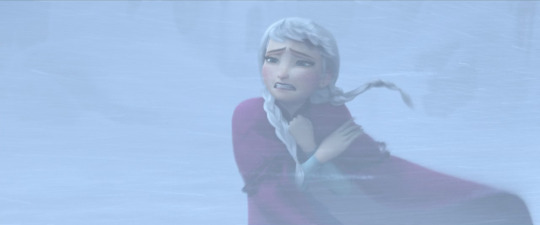
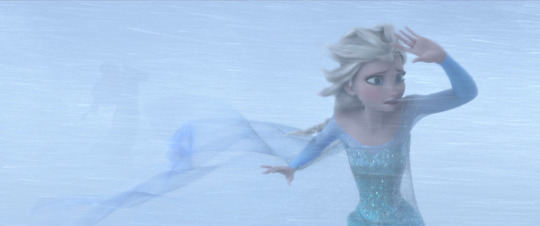

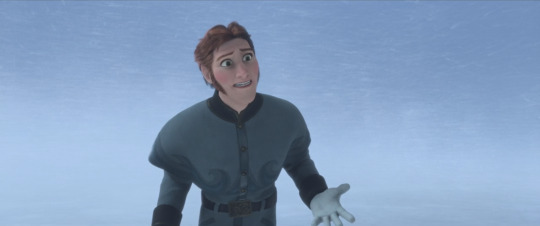
After the ensamble (rappresenting the snow storm), we have Anna, and then Elsa, taking the center of the stage and singing their lyrics, while Kristoff and Hans sing respectively as the "other-half" of these duets.
For me, this song is amazing because it reflects pefectly that "narrative balance" in Anna & Elsa arcs that the Musical manages to do, compared to the movie, which's mainly Anna's story (but this is for obvious reasons: more time, more songs etc etc). What the Musical enforces even better is Kristoff & Hans role, with their arcs becoming, the more time passes, perfectly parallel to those of Anna & Elsa.

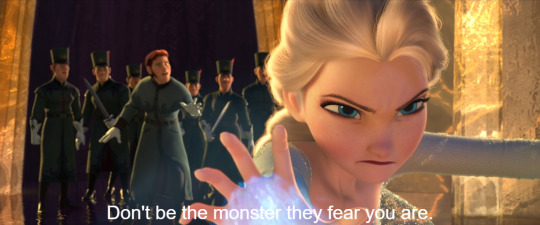
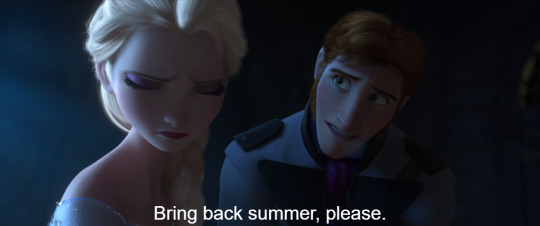

"Colder By The Minute" summs up this narration, showing how insecure and desperate these two girls are, "supported" in opposite ways by these two male characters (Kristoff out of his genuine love/Hans out of his lust for power), who are much more experienced with the outside world.
As we know, the sisters will disprove these "fairy-tale archetypes", each one solving their own issues themselves, thanks to each other, with Anna performing the act of true love by sacrifying herself to save Elsa, and Elsa finding the way to control her powers and freeing Arendelle from the Eternal Winter, all thanks to Anna's proof that she deserves love:
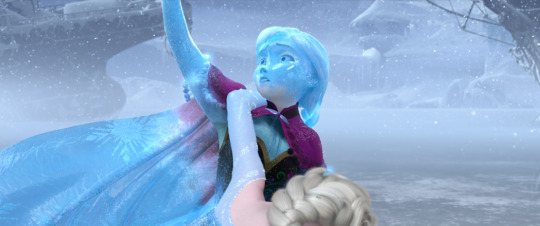
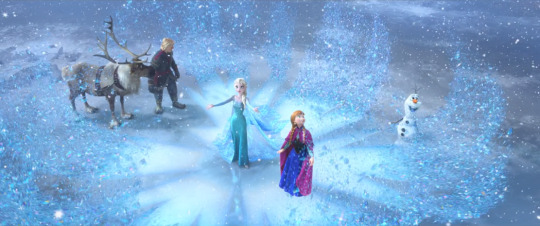
Frozen 2 gives me the idea that, working on the Musical in general (this song afterall it's the climax), than the next step was for Anna & Elsa to follow a even clear parallel path, something that would focus entirely on THEM as individuals, making their own choices, rediscovering their own family heritage, under the more self-defining concept of "destiny":
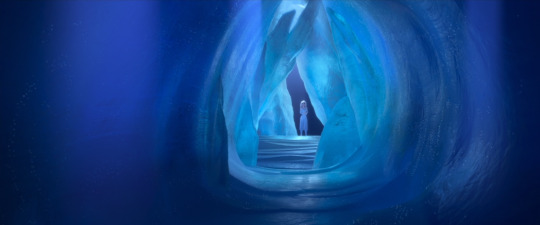
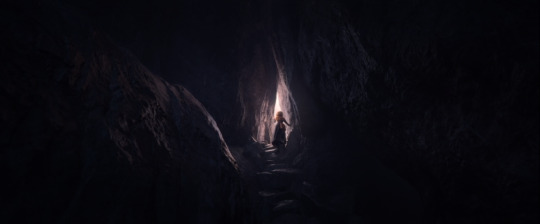
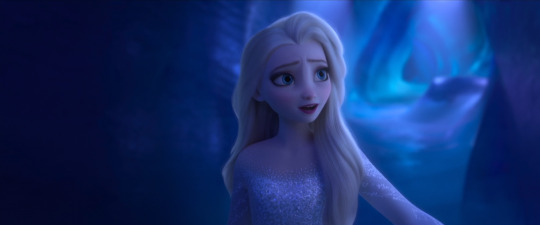
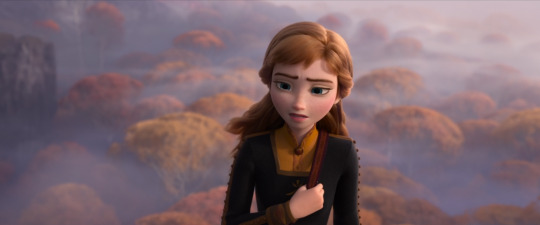
In a way, I see the two sisters following "under a different light" the paths that Kristoff and Hans took in the 1st movie, with Anna facing the changes that are coming in her life and choosing to do what is right despite the cost (just like Kristoff chose to lose her forever to ensure her safety ) and Elsa searching for her true self, risking to cross a "determined line" for her own good (just like Hans schemed in order to plan her demise and take the throne).
The resolution shows then Elsa saving Arendelle from the tidalwave, helped by Nokk and being granted with the full power of Ahtohallan, thanks to Anna freeing the Enchanted Forest from its curse by destroying King Runeard's Dam, also thanks to the help of Kristoff and Lieutenant Mattias:


This is why my main clue in case of a Frozen 3 lies in the sisters "Balance", and in the idea that Kristoff & Hans can be the key to a new story now that our two protagonists have found their "roles in the world", going through a common journey where they both hold the responsability of this whole situation, of course in opposite ways, but it was truely about THEM (the sister central discussion happens in front of the remains of their own parents ship):
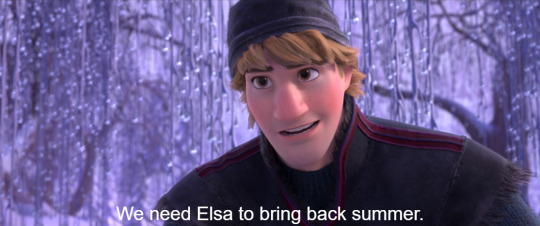



While Kristoff & Hans were the "experienced figures" in F1, Anna & Elsa are now the two "in charge" of this new status quo thanks to F2.
Even if less impactful, Kristoff has an arc, an evolution where we can see him letting some of his "inner-walls" down and finally express his feelings more openly, after a life-time used to be a nobody, living in the woods with only Sven and the Trolls giving him company, and now he's engaged to the Queen of Arendelle herself, that would clearly put him more under the spot light. Hans is not present, but it's clear that the "13th son of a king" everyone was looking at has now become a complete nobody, mocked and deprised, and with none caring about what was of him even after 3 years from his terrible actions.
Even if it's not as explicit as someone would expect (or hope for), there's actually a very strong, thin line of potential that the best way to handle Anna & Elsa status quo, to subvert things, and not losing the "Two world dynamic", may come from the only two other main human characters that actually had great importance in shaping their own present when they were struggling with their own past.

After all, Anna's relationship with Kristoff and their engagment resonates with the love of her own parents, which is now a symbol of the unity with the Northuldra, a new path she is leading Arendelle through, and Elsa's role as the Fifth Spirit is to connects the magic of nature and humanity, bringing balance through her powers and protecting the Enchanted Forest from threats like their own grandfather was:


Maybe I'm wrong ... but the logic seems to add up pretty well, considering what direction they took Frozen 2 on, how it parallels with F1 and how much the Musical was important in its development. The characters on a path that was meant to view the 1st Frozen itself under a different light, so that could be the next step in order to carry on certain themes and concepts, which doesn't mean we wouldn't get new things.
#Frozen#Frozen 2#Frozen 3#Frozen The Musical#Anna#Elsa#Snow Sisters#Kristoff#Hans#Colder By The Minute#Olaf#Sven#Arendelle#Enchanted Forest#North Mountain#Ahthoallan#King Agnarr#Queen Iduna#Northuldra
28 notes
·
View notes
Text
This is part two of a hella big post. Check out part one here. These are all a lot more recent, so I'm gonna try to be less spoilery, but there are gonna be some.
A not-so-brief history of Hawkeye in Comics Part Two (spoilers below the cut)
A note on events, dying and doubling down on Hawkeyes
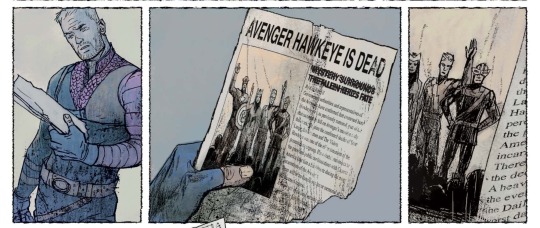
Comics love doing big events, and I'm not covering them in here. Partly because they are huge and complex and to just focus on Hawkeye would be an injustice to the stories, but also because the amount of stuff I would need to spoil would be way beyond just a little Hawkeye. Clint was involved in Secret Wars (1984), which was one of the first crossover events of its kind. Another notable era is 2004-2009, where there is an incredible amount of superhero politics driving big narratives. If you're new to comics, you might not know that characters dying is common and rarely permanent. This is relevant because while I said that I wouldn't talk about events, I think it would be pretty uncool to not mention that Hawkeye dies and is brought back to life (Avengers Disassembled, House of M, New Avengers #26). It's around here that Clint picks up the Ronin mantle.
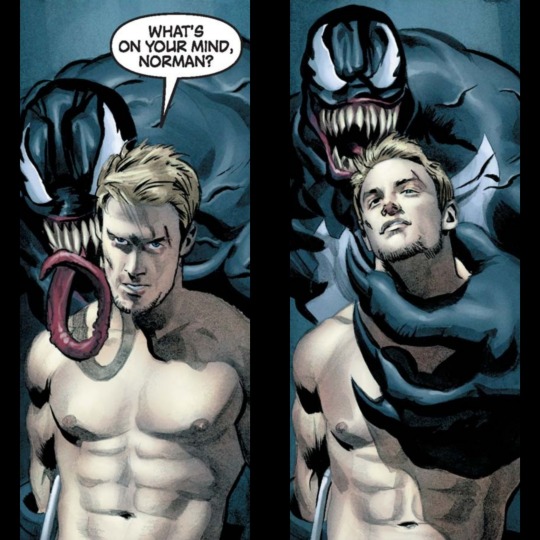
This is also when Dark Reign/Dark Avengers is going on. For anyone who'd like some Clint whump from this era, there's a top notch naked torture scene in New Avengers Annual (2009). Clint is involved in several other big events and crossovers over later years, but that's definitely a seperate list.
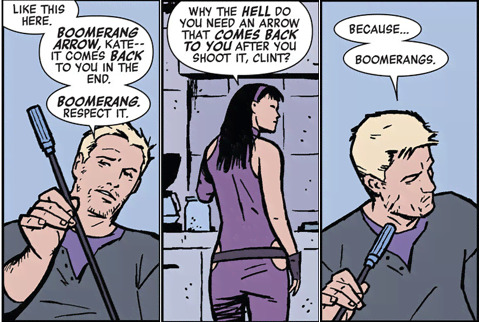
In the time where Clint is dead, Captain America is hanging out with a group of newly formed Young Avengers, including archery badass Kate Bishop. Cap suggests to her that she take up the Hawkeye mantle and gives her Clint's old bow. After Clint returns, he becomes initially her mentor, before they form a very close friendship. Clint is initially doing Ronin things, but even when he lays down ninja robes, they decide to be very Hawkeye about the whole thing and both keep calling themselves Hawkeye, despite the obvious confusion this causes.
Hawkeye's ears: Hawkeye vs. Deadpool #0-4 (2014)
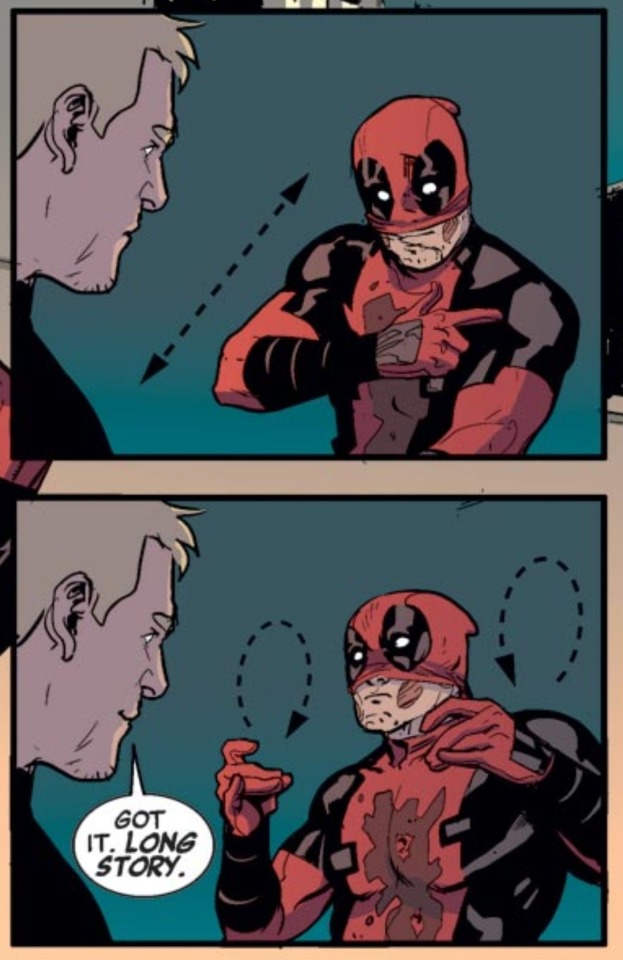
This is a fun little miniseries that you could treat as a Halloween special if you so desired. It's set in the time after Fraction's run and there are a few callbacks, but nothing major if you've not read that. Clint is a little short-tempered and hypermasculine in this run for my personal taste, but it's got lots of grumpy Clint Vs sassy Wade while they vaguely attempt to team up. The thing this run does really well is Clint's deafness, despite the lack of visible hearing aids. There are comments around lip-reading, wearing aids when wearing other headgear, there's some sign language, and this is the run where Deadpool pulls his mask up so Clint can lipread and see his face while he signs (facial expressions are really key in sign language). It's lovely. Otherwise the run gives you a Kate cameo, some Deadpool and Hawkeye disaster/shenanigans, and perhaps most importantly, the return of the skycycle.
Key background: All New Hawkeye #1-6 (2015)
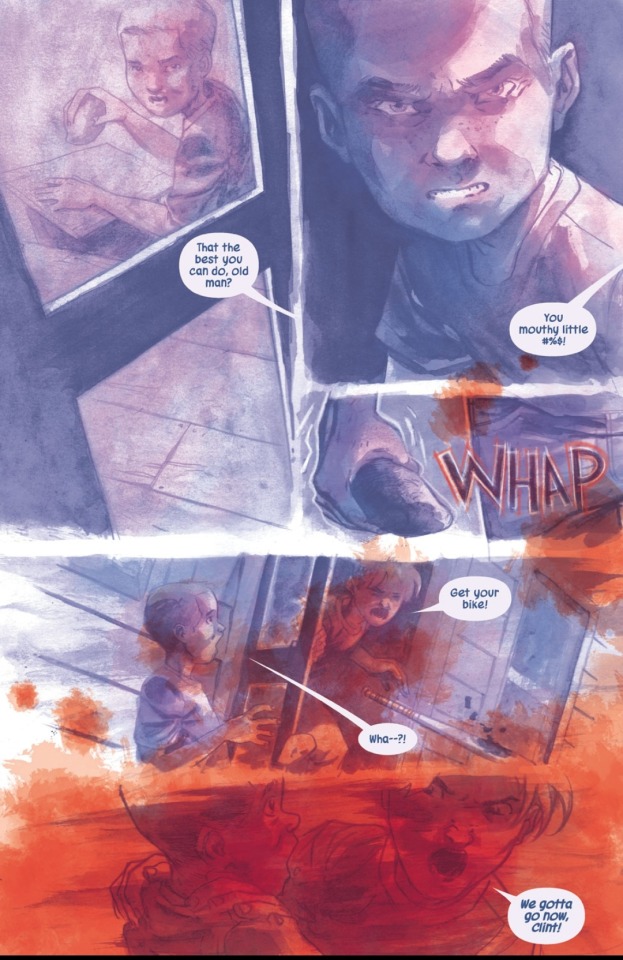
This run is often overlooked, but the art in the flashbacks is beautiful. We get some key information around Clint and Barney's abusive home situation - with their dad who drank and beat them, and how they ended up in care after their parents died, and subsequently their early days in the circus. There is a definite shift in how Barney is characterized as a bad influence compared to the 2003 run. It parallels with the rest of the arc which focuses on Clint and Kate Bishop working together to get some kids out of a very bad situation. The rest of Lemires run is a little weird and has no major repurcussions for anyone except Barney (which I won't elaborate on because it's relevant to the Fraction run).
Back to your roots: Tales of Suspense #100-104 (2017)
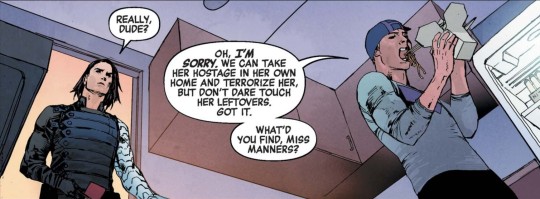
Seeing Clint cycle back and return to Tales of Suspense is really lovely. This comic is one of my all time favourites. It's incredibly tight story-telling with a great plot and really fun dynamic. The premise is Clint and Bucky teaming up to figure out the body trail being left after Black Widow's death. Clint is obnoxious and a delightful mess, Bucky is sporting a permanent scowl and is hilariously level-headed. It's a lot of fun and it's a lovely build on the tension and teamwork between these two idiots (who I, as an avid Winterhawk shipper, am completely gone for, but even without that, this is a great comic.) It also has some killer covers, and the facial expressions are absolutely hilarious.
Hawkeyes together: Hawkeye #13-16 (2017) and West Coast Avengers #1-10 (2018)
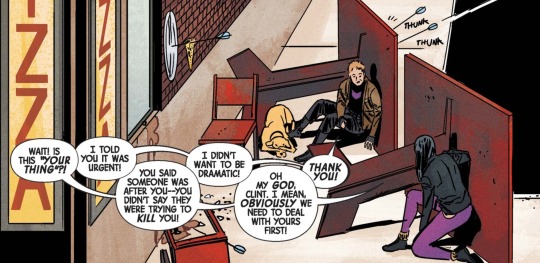
The Hawkeye run is Kate Bishops run and it has a larger continuing storyline that runs from the beginning of her Hawkeye and way into WCA, but I've listed the issues that you'll want for Kate and Clint shenanigans, and you should be able to catch up without the rest if you don't want it. These comics are ridiculously fun, especially West Coast Avengers, which has Kate leading the team this time. There's loads of jokes, and it strikes a nice balance between Hawkeyes being disasters and being hyper competent. Truthfully, this is Kate's show, and Clint takes a backseat, but their dynamic is killer here so I think is deserves a mention. There are also plenty of Clint related wardrobe malfunctions and Lucky the Pizza Dog is around.
Our most recent boy: Hawkeye freefall #1-6 (2020)
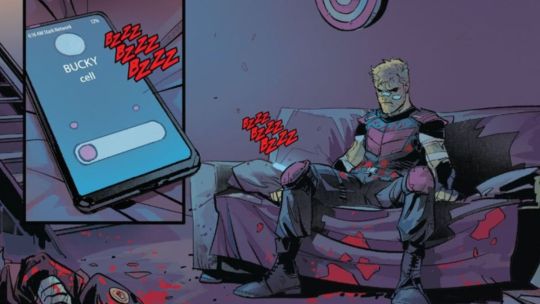
I haven't read this one yet, but it's been extremely well received by the fandom. As a result, good news: no spoilers! It's a short run, which may have had something to do with it being published during 2020, and specifically around a time when Marvel were experiencing some major distribution issues (which would have led to digital release only and as a result lower sales), but that's all guesswork because I haven't actually researched it. This run has someone dressing as Ronin and letting Clint take the blame for their nefarious deeds (oh no!). Clint makes some classic Clint (read: dumpster fire) decisions, and the art looks fun and vibrant. Can't really give you more without reading it myself 😅 If you need more Clint still, he's also rumoured to be knocking around in the 2020 Black Widow run, but I've not had the money to get my mitts on that yet either.
Notable AUs:
Marvel is a big fan of throwing a well known cast into an alternative universes, so there are a few other places to look for him.
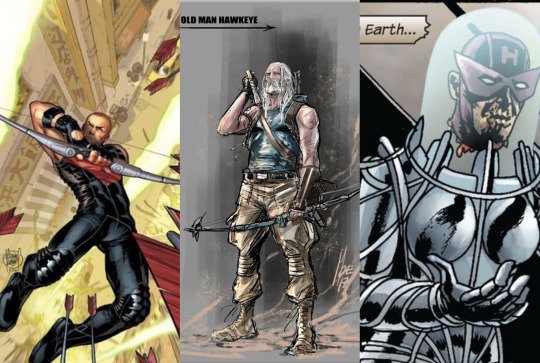
The Ultimates universe was largely speaking a bit of a shitshow, but they did give us a very dark and gritty Clint, so if that's your jam, ultimate hawkeye is the place to be. Old Man Hawkeye appears alongside Old Man Logan, and they are both, you guessed it, old. It's not the only time we get Clint as a wrinkly dude (the second half Lemire's run also has some timey-wimey stuff happening), but this is a version of Clint who is going blind (granted we've seen that before too, but this is a darker vibe than Blindspot). Wanna know who the greatest marksman is without his sight - old man Hawkeye for you! Finally there's the Zombie 'verse: zombie Clint is a little confused, but he's got the spirit. Clint got zombiefied and then left in some rubble as only a head for 40 years before getting picked up, so he's a little worse for wear. If you need that in your life then Marvel Zombies is your universe. For a full rundown of all the universes including animated and MCU, click here.
Notable aliases:
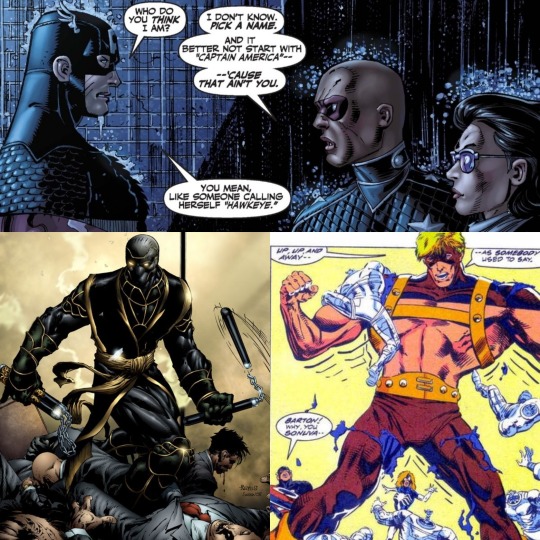
Clint's been a few other people than Hawkeye in the 616 universe (the main Marvel Comics universe). He used one of Hank Pyms growth serums and became a giant strongman in Avengers #63 (1969) and stuck around in his Goliath form for more than a few issues. After Cap had died, Clint returned from the dead and tried on Captain America for all of one issue in Fallen Son #3 (2007). He decided (with a little help from Kate) that it wasn't right to wear the uniform, which in turn led to some interesting tension between him and Bucky Barnes when Buck did become the new Captain America. Finally, there's his most well-known alternate persona: Ronin. Clint becomes Ronin after returning from the dead, wanting a break from his Hawkeye persona and an opportunity to become Ronin arises in New Avengers #27 (2007). Clint is not the only person to have used these aliases. Additionally, Hawkeye has been used not only by Clint and Kate Bishop, but also by Bullseye during the Dark Reign.
The things we haven't talked about
Like I said at the very beginning, there is a lot of Clint Barton knocking around in comics and even with all this there's a lot of content I haven't focused on. For instance, I've not talked a lot about his relationships, beyond his marriage to mockingbird (and really I only scratched the surface with that), and honestly once you start getting into interpersonal relationships we're starting to move on from what can be done in a Tumblr thread.
There are also some topic specific threads floating around, which you might like to look at too.
@vaguelyrotten has done a run down of some great dumpster fire Clint Barton comics (some of which I haven't listed) and you can see that here.
@bobbimorses did a great summary of Clint's historical deafness for instance which you can find here.
There's also this little bit all about Clint and Bucky in canon (thanks to @nightwideopen ) and how Winterhawk became a thing (thanks to @1000-directions )
This is slight sidenote, but @clintscoffeepot did a really great comprehensive of Fraction Clint's apartment which is just a really useful writing resource and you can get that here.
There is also this website which I stumbled across fairly far into writing this post which does actually look like it might be comprehensive.
If I've missed anything major, or listed something incorrectly or you just have some Clint related opinions that I need to know about, do hit me up.
#clint barton#Hawkeye#hawkeye comics#hawkguy and other costumes#deaf hawkeye#comic#comic books#marvel comics#let's talk about comics
90 notes
·
View notes
Note
When MVA/MLA Arc gets animated, what will you be looking forward to the most? What (canon-compliant) additions and/or changed do you want or think Bones should make, if any?
There’s--a lot. Does that surprise anyone? There’s a lot.
o I have been foaming at the mouth for voice actor announcements for almost a year now, particularly for Trumpet, Geten and RD. Trumpet’s superpower is literally his voice! I mean, nothing about that statement requires that voice be particularly entrancing, but it certainly seems like it should be, right?? Geten is a boku-type in the manga, but that was literally the only hint foreshadowing his pretty boy face through 21 solid chapters of Pure Feral Gremlin. Everyone was shocked by Geten’s face reveal! How do you maintain that surprise value with an actual voice actor in the mix? Do you not even try? Do you play up the disparity--in which direction? I can’t wait to see what they do. And Re-Destro! Re-Destro requires so much range! From his peppy, silly businessman persona, to the urbane commander, from the overeager yes-man to the raving zealot--who on earth do you get to believably cover all that ground? I can’t even begin to guess, but I am living in anticipation of that article going up on ANN or the official Twitter sources.
o I’m also much looking forward to getting official coloring on Trumpet and Geten. Skeptic seems pretty straightforward--black, black, more black--and RD and Curious, we have color art for, but I wonder if Trumpet will also be all black clothes, to go with that dignified politician image of his, or if he’ll get some color to pep him up a little. What color are those tinted shades of his? His eyes? The wicked-cool Sevens Loud? I assume Geten is all wintery shades, but it’ll be great to confirm which ones. I mean, we all assume he’s white-haired to better annoy Dabi with family parallels, but what if he turns out to be platinum blond? And are his eyes blue? Gray? White? What color is that awful parka? Also, Re-Destro’s stress powers. Having been writing them as black since at least August--Rorschach test blots are generally black, after all, and they’re the clear inspiration--I would much like it if the anime would have my back on this. They made Destro’s mask a dark cinnamon brown, though, so I’m prepared to be unpleasantly surprised in this matter.
o Predictable MLA adaptational choices aside, I’m also eager/anxious about how they’ll handle Spinner’s narration. What I really hope is that they actually straight-up hand him ALL the narration duties--not just the stuff he dictates directly in the manga, but also e.g. the name and quirk explanation material that Present Mic normally gets, or the previews that are always handled by Deku. The opening and closing sequences are another big structural thing, of course--based on the flashed snippets of Hawks and Endeavor in both our current and the previous OP, I’m expecting we’ll see at least a bit of something referencing the upcoming internship arc (which I expect to close out the season), but I hope the villains just walk away with the closing entirely. I want my slice of life villainy ED, dangit.
o Another thing I’m eager/anxious about would be Kotarou, and the Shimura flashback generally. There’s a brittle edge of to Kotarou that I really love, and I hope he manages to keep it in the anime, despite the anime being generally not so great at moments that I would describe as “delicate.” For example, I’d like it if he doesn’t get a super deep voice, and if they could manage to keep his pretty face, and capture how deeply bitter and tired he looks in the scene where he’s reading the letter Nana left him. Also, I hope they keep the little montage bits and, crucially, the changes of clothes the family goes through. We see Tenko in no less than five, possibly as many as seven, different T-shirts through the course of that flashback. It seems like a small thing, but it’s one of the factors that makes me skeptical that AFO gave Tenko Decay, when so many days clearly go by between the opening with the man at the door and the tragic end. It’d be nice not to see too much resurgence on that just because the anime can’t be bothered to come up with more than one outfit for the Shimuras.
I have enough issues with the anime’s usual adaptation choices that I’m trying not to get my hopes up too high on the actual content of the episodes. The staff is diverting too much of its major talent to the movies (BAH) these days for me to expect the whole season to look all that great, and it’s never been particularly creative or daring outside of its climactic sakuga-heavy fight scenes anyway. I’ve also long had a bone to pick with its scoring decisions, and am already eyeballing the climax of the RD/Shigaraki fight and imagining the minor-keyed terrifying dirge I fear the anime will play there, at the moment that Re-Destro (and, shortly afterward, Spinner) are supposed to be experiencing something akin to religious awakenings. There’s also the issue of the violence and gore--judging by how the anime handled the scene where Shigaraki and Compress maim Overhaul, I have some severe reservations about how much blood they’ll be allowed to get away with, particularly in the scene where the League brutally decimates that CRC group and, of course, Shigaraki’s backstory. I’m looking at MVA to serve as a preview for how all the same issues will be addressed in the War Arc.
That bit of pessimism aside, as to what I’m hoping they’ll add or change? Well, off the top of my head.....
o I would love to get a full episode devoted to the time the League spends fighting Machia. Not that first tussle, but the six grueling weeks in the mountains. There’s so much you could add there for character building and atmosphere that Hori didn’t so much as montage through. Where was their food coming from? How’d they pick out places to pitch camp? How much access to news from outside did they have, and how frequently? What were the circumstances in which Gigantomachia “told them himself” about his great sense of smell?? Stuff like that! I don’t think we’re at all likely to get this--honestly, the series of late has had enough of a problem with trimming bits and pieces that I’m as worried about what they might cut as I am hyped about things they might add--but the one thing that gives me some hope is the training camp arc. Specifically, the moment 1-A first gets to the Pussycats’ forest, they get jumped by earth golems, a fight that the manga off-panels entirely, but the anime spends a modest amount of time on, giving the kids a little bit of time to show off their moves and such. I’d love to get something equivalent for the League.
o On a similar note, I wouldn’t turn it down if they fleshed out some of those running street fights a bit. One obvious thing comes to mind: there’s a weird jump in the manga between Skeptic and a horde of his golems being all but on top of Twice at the beginning of 233 and then that fight just--doesn’t happen. There’s no mention of it at all. I think the suggestion is that either Machia’s appearance or the tower going down interrupted it--Skeptic breaks off from his fight the same way Geten and Trumpet do theirs, shifting focus to protecting Re-Destro--but it’d be nice to see the anime touch on it.
o It’d be nice to get a bit of expansion on the nature of the bullying Spinner endured. We’re told he was, but was it limited to verbal? Did he get beaten up a lot? Was there an online element? Deku’s our only other reference point for “bullied kid,” and whatever one might think about the story’s development of Bakugou’s mentality, it’s been made clear in retrospect that there was a lot more too that than just the matter of Deku’s quirklessness. I’d love to know how Spinner’s bullying looked in comparison (not least because of some of the theories about Spinner and Deku needing to come to some kind of accord to free Shigaraki from AFO).
o Make the Villa (both here and during the War Arc) look more realistic. By which I mean, I know Horikoshi is capable of drawing interesting and lived-in interior spaces--he has an entire chapter dedicated to it in the 1-A dorm room contest, after all--but he normally doesn’t bother much with it. At UA, it’s not too distracting, because we know good and well that that whole building is probably maintained by Cementoss anyway. Ditto places like Tartarus (intentionally, dehumanizingly barren) or the League’s post-Kamino hideouts (abandoned homes and industrial spaces). But the Villa? For heaven’s sake, it’s called a mountain villa. It has a clear reception desk on the ground floor; it’s obviously some sort of high-end hotel, if not an outright resort or rentable retreat lodge. Speaking as someone who’s worked in one, places like that don’t look as fuckin’ bare as the rooms we see there always seem to. For fanfic purposes, I’m happy to go on telling myself that e.g. the pool and the bar and the restaurant(s) and the gym are in the building Cementoss doesn’t tear in half, but it’d be nice if the anime could class the whole place up a little, maybe put some real furniture and decor in the rooms that are in use. (Yes, I know this is a ridiculous nitpick.)
o This is less a change and more a correction, but for fuck’s sake, BONES, give us white-haired Shigaraki. The climax of Deika is a solid time for it, given that it’s obvious in the manga that Shigaraki’s hair gets paler in Deika--you can see it in the way Horikoshi inks it (which is to say, the way he stops inking it)! I think if we ever get white-haired Shigaraki in the anime, a somewhat better time as far as narrative justification goes would be when Shigaraki gets out of the tube in the War Arc; you could easily justify it as a side-effect of the surgery. Still, I’d rather see it here. I want white-haired Shigaraki, gleaming and brilliant through the scattering ash in that crater, a veritable angel of sacred destruction. Honestly, more than anything, the crater sequence is the one I hope I love. It’s probably my favorite single moment in the entire manga, as Shigaraki wins over Re-Destro, Spinner and Gigantomachia in the same moment, and finally comes into his own. If they can at least nail that, I’ll consider myself pretty satisfied.
#stillness-answers#my villain academia#meta liberation army#boku no hero academia#bnha#hopes and dreams
15 notes
·
View notes
Text
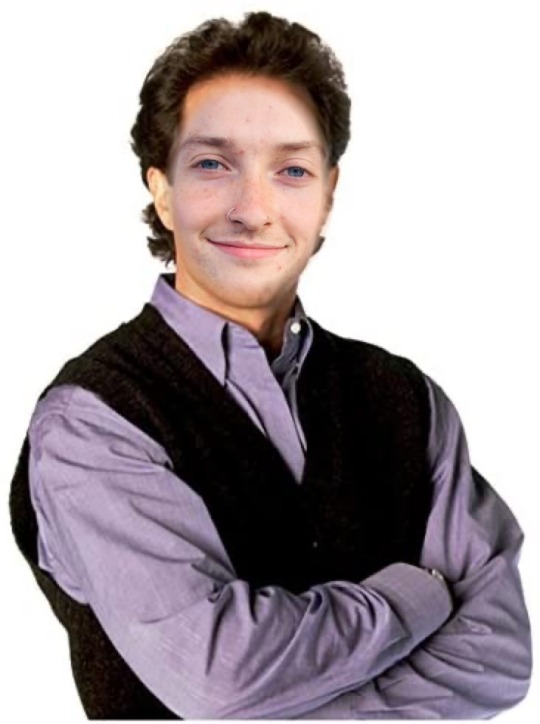
Noticing (or a Case for Seinfeld Living)
It’s really impossible to know definitively, but I’d say I’m about halfway through the fourth or fifth season of the second reboot of my life’s tv show.
This is more of an estimate - I’m not really sure how I’ve been dividing up the seasons. Obviously, the first season was the 3-4 years at the beginning where nobody really knew what was going on and the protagonist was kind of just there. He was arguably, more of a blank canvas for the audience to see themselves through, as the real protagonists (his mom and dad) did all the expository heavy lifting. To be fair, this was just an introduction to the series and audiences were at least impressed enough for it to be renewed.
The formula found its bearings in the second season, as most successful shows tend to do, and stayed more or less on track for ten seasons till adolescence prompted a hard reboot. I can’t stress enough how much the show changed: episodes varied widely week to week, multiple characters were booted, the previously so-called co-protagonists of the show (those rascally parents) occasionally became outright antagonists, etc… It was quite frankly, not that great of a show, and in many ways traded the lack of conflict of its predecessor, with an abundance of conflict rarely resolved. It was not a show anyone was enjoying and the second college reboot was a welcome return to form.
This latest season is not half bad. We’ve got a lot of good series-wide story arcs going. There is a fair amount of midseason conflict, reoccurring characters that are staying relatively fresh (with the exception of Trevor), a decent theme song (it’s currently some experimental jazz from hell), and I’m really feeling like the protagonist is “starting to figure out what his deal is”, so to speak.
It is important to note that the protagonist has “started to figure out what his deal is” many times before this season, so I wouldn’t necessarily trust his judgement, but the confidence is remarkable.
He, at the very least, seems to finally be able to admit that he is not a cool person, which is certainly progress. Naively, though; he is convinced that this admission might very well be the first step to eventually becoming cool.
Most engaged viewers know this is a misstep.
~
“Life’s not like a movie” might be as useless of a phrase as it is pervasive. The assumption of the phrase implies that everyone is going around living their lives like the main character in a blockbuster comedy - cartoonishly pursuing their dreams, accidentally falling in love, and somehow, repeatedly being surprised when things don’t work out the way they think things should.
This is clearly false. No one thinks like this.
No one thinks everything will work out. No one thinks they’ll get everything they want. No one thinks their life is simple. No one thinks they’ll find the complete answer to the question they’ve been asking all along.
No one is nearly as naive about their existence as we seem to think they are. And I don’t think people watch movies and TV shows because they want these things either.
Sure, maybe there is someone out there who says they want life to be this uncomplicated, straightforward thing, but no one actually believes them. Nearly every person I’ve ever met genuinely believes that they are the true pragmatist. Has anyone ever actually met a consciously sincere idealist? Who wants to be the sucker?
Perhaps I’m generalizing, but I don’t think people watch television or movies, read books, and tell stories because they are innocently convinced of the simplicity of their narrative structure or because they want to vicariously live through that simplicity either. People are not starry-eyed, gullible children, nor do they wish they could be. People reflect their lives through story, not because they make life seem simple, but because these stories make life seem meaningful. I would go as far as to say - they don’t just make life seem meaningful, they remind them that it already is.
~
My friend Trevor and I believe genuinely, that we are this latest generation’s reincarnation of the 90’s sitcom, Seinfeld. He is George and I am Jerry, respectively. We’ve drawn out many of the parallels over the course of our friendship and I will list them here now:
- Trevor is short and stocky (George), while I am tall(er) and lanky (Jerry).
- My friend, Sam (Kramer) often walks into my house unannounced, hair lopsided, looking to “borrow” things from my kitchen.
- We routinely complain about our lives at various diners/coffee shops loudly and with little sympathy for the people around us. (The plot of the show)
- We improvise neurotic standup routines about the absurdity of mundane life and our own selfishness. (Much like George and Jerry, these routines are more sad than they are funny)
The only thing we’ve failed to find a direct parallel for is Elaine, as perhaps the most unrealistic aspect of the show, was the fantasy of anyone staying good friends with their ex.
All of these specific comparisons aside, I think what Trevor and I really like about this joke, is the idea that the only difference between our lives “in the real world” and our lives as tv characters, is the perspective that comes with observing rather than experiencing. What I mean by that is to say, there is something inherently and beautifully constructive about observing years as seasons, days as episodes, and people as characters. They become features of the life we are actively noticing, not just necessities of the existence we are passively being forced to endure.
As many sad, 90s-sitcom-obsessives like myself know, the significance of the creation of the Seinfeld rested in the catchphrase Larry David and Jerry Seinfeld sold the show on - it’s “a show about nothing.” The idea of it was, if you take a comedian like Seinfeld and put him in a variety of mundane settings, the jokes will come, not from heightening his experiences, but by letting him endlessly interpose his observations on the absurdity of the mundane itself. But I don’t think that’s significant in the way people may think it is.
Yes, George/Jerry/Elaine/Kramer are funny, goofy people with above average neurotic tendencies. Yes, it is a situational comedy written by professional comedy writers, building narratives out of the ways standups get their material. Yes, it broke many mainstream television conventions and historically broke the formula of the sitcom. But I think the most brilliant thing Seinfeld did, is definitively inspire the tacit belief that everything is worth paying attention to. Maybe, it’s worth noticing because its infuriating, or ridiculous, or hilarious, or disturbing, etc… But absolutely everything demands to be noticed.
In the fourth season of Seinfeld (arguably the best and most influential season), George and Jerry begin developing a TV show in much the same way Seinfeld and Larry David did four years prior. Throughout episode after episode, they go back and forth trying to come up with some fresh idea to wow NBC executives. This goes on with some degree of expected laziness and hijinks till George finally has it. Ever the meta-self-referential goldmine, George decides it should be “a show about nothing.” NBC executives are neither wowed nor thrilled, but the pilot get’s made, and all the characters in Seinfeld get remade in the show-within-the-show - “Jerry”. This was genius for two reasons.
It justified itself as a show by explaining its own concept directly to the audience through the show itself. (Perhaps the reason why this season skyrocketed the shows viewership)
It explained how television works, and more importantly, it explained how stories work.
The characters of Seinfeld, much like the characters of any story where the writer takes the time to describe them, are just bizarre people living in our bizarre world. Brought to their logical conclusions, television characters are human beings incapable of not observing the particularities of their existence. They go to the same coffee shops, they hang out with the exact same people, and they can’t stop scrutinizing the smallest detail of, or change, to that reality. Television shows remind us that the details of our existence are interesting.
The characters we surround ourselves with can be the funniest people in the world when we notice why they do what they do. The job we spend thirty to seventy hours a week at can be the weirdest thing in the world when we notice how ridiculous it is. This year can be a not-so great season. Tomorrow can be a particularly great episode. The television show we’re participating in can be surprising and disappointing and funny and sad and predictable and strange, but its a show we choose whether or not to watch - just watch it!
~
Sometimes, when I have a bad day, I go home, I go to bed, and I narrate out loud, “Hudson was not having a good day.” It almost always helps. Not because it reminds me that I am an insane person and that’s funny, but because it reminds me that I am a character in a movie I am watching, not just playing a role in. I am the protagonist of my own movie, playing a character in other people’s movies, learning how to notice why we’re in a movie at all. Any moment that we don’t realize that, that the story is meaningful, whatever it is, is a moment lost to ourselves.
"Life’s not like a movie” is a pointless phrase that doesn’t mean anything about anyone. We know life is not simple, but we want life to be consequential. Stories tell us it is. So we remind ourselves by telling the stories and listening to the stories and vice versa and on and on till we're dead and death is always a pretty good story too. (Almost always a great tv show or movie)
Life may not be painless or easy, but it is certainly interesting. Movies, television, novels, myths, comics, plays, etc… Those things are at their best when they remind us that the only difference between letting living pass us by and actively choosing to experience existence, is the amount of attention we pay to it. The latest season of the tv show that is my being is sometimes pretty rough, especially when I’m arguing with Trevor about who the main character is, but it is not boring. I can’t ask for much else.
7 notes
·
View notes
Text
Followup on Evangelion
This post was supposed to happen quite a while ago, but stuff happened and I forgot to do stuff so here we are. Like I did with my Re:ZERO followup, I just wanted to come back to look more broadly at the rest of the series here instead of getting into individual episodes. I previously talked about eps. 1--8, so this encompasses everything 9--26.
Before we get to the actual review, though, I need to tell you something bout my background, and consequently one of my biggest pet peeves. I’m an engineering psychologist by training, and so although I’m not remotely qualified for the clinical side of things that people always associate with psychologists, I do know a fair amount about normal thought processes. And you know what I am absolutely certain of? Freud was wrong. I don’t understand why we give him so much attention in intro-level psych classes, and I suspect that people often come out of those classes knowing less about psychology than they would if they hadn’t taken the class at all because they’re required to learn about Freud. Freud was influential, sure, but that’s mainly a bug, not a feature. He tried to develop an all-encompassing model of normal development and cognition based entirely on psychiatric patients (maybe not the greatest approach?) and ended up with a body of work so ad hoc handwavy that philosopher Karl Popper used it as an example of something “unfalsifiable” -- that is, one could not even in theory run an experiment which would prove Freud wrong, because there are no specific observable results that Freud’s theories couldn’t produce an explanation/excuse for like some kind of game of research Calvinball. He maybe deserves to be mentioned as one of many “founders” of psychology, but really, unless you’re in a class on the philosophy of science or the early precursors to actually scientific mental healthcare, I cannot understand why we think he’s worth discussing in any detail. Do we start chemistry classes with a week on the ancient Greek elements of earth, water, air, fire, and ether, and test students on the final on the theory of how those elements interact? No? Then why do we start psychology classes with a week on Freud’s theories and test students on the final on defining the id, ego, and superego or the psychosexual stages of development?
Why is this relevant? Because the second half of the series gets frequently and intensely Freudian. Some people draw parallels between Asuka, Rei, and Shinji and the Id, Superego, and Ego, and yeah, okay, I guess so, but I’m willing to accept that as a character dynamic that works well. Then, in the backstory episode about the establishment of NERV, we get exposition about the three-part Magi computer system being different aspects of its creator’s personality, which is pretty hard to not see as another id-superego-ego set. My real issue is with the psychosexual angle. Misato, for example, can’t stay way from her ex Ryoji, but also repeatedly compares him to her father, including immediately after an off-screen (but voice acted) sex scene. There’s an entire out-of-body experience episode where Shinji, temporarily merged with his Eva, directly experiences his own subconscious desires for sex and praise that all boil down to “he misses his mother” (who is filled in for, in a way, by Misato here, as she is the person who brings him back out of the Eva into the world and the first person he encounters when “born”, if you will... and of course in true Freudian fashion, she appears as one of his possible sexual partners in the out-of-body experience). And I just... hate that aspect of the show and need you to know it.
That is not at all to say I haven’t enjoyed and appreciated the rest of Evangelion, though. The angels, varied and bizarre, are one of the best uses of the monster of the week format I’ve seen in any show. Their capabilities are poorly-understood even to those shown to be experts in-universe, and they are a genuine threat to the characters. Serious injuries to pilots and Evas alike are common, and the number of implied or explicit civilian deaths and the amount of damage to Tokyo-3 and NERV HQ escalate dramatically. They are, ludicrous technobabble explanations aside, a truly and horrifyingly alien opponent, whose motive is not even revealed until about halfway through the series, and whose potential impact (ha!) remains hidden to the main characters. Those revelations come up organically in dialogue that establishes how secretive and how deep into mad science NERV truly is. Blah blah spoiler spoiler, suffice it to say that Misato is not well-filled-in on what exactly NERV is doing, and learns some things from Ritsuko and Ryoji that have pretty disturbing implications about the capabilities and direction of their technology. All the while, the “Human Instrumentality Project” looms in the background, mentioned but not explained until the very end when it is put into action.
Our main trio of pilots experience some character development that, again, I find very believable for teenagers thrown into a level of both danger and responsibility that they can’t handle. Asuka’s arrogance and competitiveness turn from quirks into tragic flaws as she recklessly tries to prove herself to be the best Eva pilot, and are also revealed to be part of a more complex and general need to prove herself to be serious and mature. (Not to mention, she is infuriating precisely because, again, she’s realistically written... her mixture of resentment and longing for Shinji and her wildly age inappropriate crush on Ryoji both remind me of people I used to know.) Rei, who has never known anything but NERV’s single-minded dedication to making her a pilot (and who, like Shinji, is a victim of Gendo’s abusive parenting), starts to have the first vaguely normal human relationships of her life. And Shinji tries to run away again, but I promise, it’s different this time.
No, that last one’s not in there as a joke -- I think this is an important turning point. In ep. 18, Gendo remotely takes control of Shinji’s Eva to force it to do something Shinji refuses to do. Shinji is understandably horrified by this, not just because of the violation of his autonomy or something but because of the terrible thing he has now experienced doing (remember, pilots are neurologically connected to their Evas and share their sensations), and in the next episode, in a burst of sheer hatred for not just his father but all of NERV, he quits again. Most of the other characters still treat him as running away due to weakness or indecision, like they did earlier in the series, but he has a reason now. They are falling victim to a “boy who cried wolf”-like problem, reacting to what they have come to expect from Shinji rather than to his actual motive. He is persuaded to return in order to protect his fellow pilots who have become his friends, and then the next episode is that infuriating out-of-body thing, but the fact remains that this shows Shinji has grown across the series, from acting out of fear of and/or familial obligation to Gendo to acting out of a desire for praise (see ep. 12) to feeling like he has an actual role and mission to play.
Meanwhile, it becomes clear that Gendo really is the sinister mastermind he appeared to be. While his colleagues in the shadowy council -- called Seele -- attempt to rein him in, and he theoretically is responsible to a chairman of that organization, the real power is with Gendo and the sheer amount of mad science he can muster under secretive or outright false pretenses. And... wow, there’s not much I can say about that, because there’s not much I can say about episode 19 and beyond without revealing backstory the show wants to keep secret until this late.
What I can say, though, is I think the show fumbles hard on its late episodes, even before the notorious original ending. Up to this point, I thought the show had been improving in general in its ability to tell an interesting story, but it dives back here into the same problem I had early on where it’s difficult to tell how much time has passed within or between episodes, and that creates more of a problem this time around for the basic ability of the audience to empathize with the main characters. Perhaps this explains why there were alternate Director’s Cut versions of these specific episodes? (I don’t know because I haven’t seen them, and they’re apparently only available to English-speakers on the 2004 “Platinum Collection” DVD release, and I am not paying the $120+ that eBay sellers want for them.) I suppose it’s possible that the unsatisfying endings of our main cast’s arcs are intentional, and reflect how pessimistic Anno himself, and his initial description of the show, were, and there’s certainly nothing wrong with a downer ending per se, but episodes 21-24 don’t manage to land them for me. Asuka fails at the only thing that makes her feel valuable, Rei has her tenuous human connections and her means of maintaining them if anything happens to her taken away, Misato realizes maybe NERV has been the bad guys all along, Shinji finally shows agency and makes an important decision for himself but immediately regrets it... all of these clearly should be tragic, but they just didn’t make me feel as sad for those characters as I know I should’ve.
Asuka’s brief and mostly-offscreen abandonment of NERV in the face of her plummeting confidence, the introduction of the Fifth Child, Kaworu, and Ryoji’s sneaking of secret information to Misato all are great plot points that could have had dramatic conclusions, but they all fell flat for me. The episode focusing on Rei at least makes sense in tying together many things implied by previous episodes, and fills in or confirms some things we’ve already seen. For example, it confirms the existence of literal souls in this narrative universe, so now we know to take certain aspects of Shinji’s out-of-body experience -- the loss of sense of self, and the feeling of having recontacted his mother’s soul -- as literal rather than just a storytelling device to display the Freudian subconscious, and the angels’ ability to make direct mental contact with people by this point certainly seems to be literal magic, not some sort of exotic biology.
But episodes 21-24 in particular feel like a rapid-fire dump of partial ideas with the dramatic pauses in all the wrong places -- exemplified by the minute-long still shot as Shinji decides whether to stop the final angel from [spoiler] that changes the scene from tense to absurd. It is, in other words, paced poorly, and this isn’t just bad news for individual episodes, but for the ability of events to matter to the audience. I also expected to have something to say about the gay content in ep. 24 that the professional internet commentators are obsessed with talking about (specifically, talking about how much Netflix screwed it up with a very small translation change), but that aspect of that episode in particular was overshadowed for me because the show just failed to show enough of a relationship building between Shinji and Kaworu for it to mean anything. Even with the “love” to “like” change, I end up coming away with the impression that Shinji has a crush on Kaworu (whether Kaworu feels the same or just doesn’t get how normal people interact), but that doesn’t mean much when their entire series of interactions seems to be over less than a day(?).
And so we come to the two-part finale. With no more angels to interfere, the Human Instrumentality Project begins. We first see our pilots suffering separately in their own despairs and doubts, Shinji and Asuka both suffering from needing to be needed, Rei wanting to die permanently this time but afraid now that it’s finally an option. The Project apparently forces direct contact between everyone’s souls, though, and we see how the exposure of feelings we do not wish to express or even think about can be even worse than isolation. Misato and Asuka both totally break down upon directly encountering Shinji’s soul and involuntarily sharing their most upsetting and embarrassing memories with him.
Or, well, that seems to be what Shinji’s getting from them, anyway. We don’t actually know what they’re experiencing, I guess, since we quickly learn this is only Shinji’s personal experience of Instrumentality. He, and implicitly everyone else, is stuck in his own personal incorporeal world having an internal argument and trying to navigate an entirely new way of existing not constrained by the physical world. The visuals themselves meanwhile regress to sparsely-detailed still images, then to storyboards, then sketches, before suddenly popping back to full animation as Shinji experiences another “possible world”, a frankly hilarious couple of scenes reimagining the show as a school life comedy. Shinji begins to untangle what he thinks of himself from what others think of him, and is instructed by visions of his friends and colleagues that, among other things, conventional associations between concepts are just that -- conventional associations -- and they don’t need to mean to him what he thinks they’re supposed to mean. Then this fascinating mindfuck of an ending, which up to this point I have been genuinely enjoying enough to forgive its Freudian jargon, crashes to a halt with the resolution that he just suddenly accepts himself, abruptly. And then everyone clapped. The end.
I feel let down, because it just sort of feels like Anno wanted very badly to resolve Shinji’s misery, but just whiffed on how to pull it off. “Just stop hating yourself”, even given some sort of amazing supernatural opportunity to do so, is a bit too “have you tried not being a monster?” of a resolution for me. I’m not asking for realistic therapy in my anime, but maybe there was some better way to show him changing his entire outlook? And then I feel let down again because I finally remember that we cut to this abruptly and are totally ignoring what Instrumentality is doing or will do to everyone else, something that is such a wild shift that it is certainly the end of the world as we know it, to zoom in on just one person’s inner conflict in a very surreal way for two entire episodes. So... yeah. That was Evangelion. Yup. It was a solid sci-fi (or... sci-fantasy, I guess) premise that went in interesting directions, although not always executed well. I appreciated it, and I would be interested to see how it has been repeatedly remade by its own creator. Just, uh, not right now.
Come back soon for a third post about Evangelion, which will be a headcanon and/or questionable interpretation that probably nobody wants or needs but which I feel compelled to share.
1 note
·
View note
Note
Before you get to the arc payoffs, I think it would be cool if you could illustrate your thoughts on the journeys the main characters have gone on to get to this point. Like, your thoughts on their consistency and what you think worked and didn't work, aside from Perrin's plotline temporarily dying and Mat disappearing for a book.
This is an excellent question and I could probably take several weeks to compile an answer but I’m going to answer it now because I am an adult who is entirely in control of her life and her choices especially regarding fiction, fictional characters, and the discussion thereof.
‘Main characters’ is a rather flexible definition in WoT so I’ll start with the original set from EotW and go from there, and we’ll see how far I get.
(Okay it turns out I only got through the Emond’s Field group, becasue I’m me and I can’t just write a sentence or two for each one, but I might try later to do the same for some other characters)
Rand al’Thor: Rand’s character arc, and the way it’s executed, is fantastic. He definitely benefits from the sheer length of the series (well, his arc does; he just suffers), because it allows for a nuanced, complex, thorough character journey from farmboy to broken hero, from human viewpoint protagonist to distant focal point around which everything spirals, from determined trusting optimist to desperate half-mad fatalist. Any of those transitions can be and have been done in shorter wordcounts, but the length of the series, and the way everything about what Rand does and goes through escalates a little (or sometimes a lot) with each book, gives his arc this feeling of an inexorable pull, of compounding pain, of just a series of small steps, each only a little further than the next.
When you have 12 books (so far) to do that with, you can end up a huge distance away from where you started, without it ever feeling like too great a jump. Each ‘level’ (either of what he has to endure or what he himself does and becomes) is gradually normalised over time; he and the reader acclimate, so then it’s time to step up to the next. Put The Last That Could Be Done after, say, Falme, and it would still hurt but it would feel almost like too much (and also not enough, because it would lack the weight and momentum of everything that came before). Instead, you get to watch the slow unravelling of a character even as his power grows, tension building, until (like his ancestors the Aiel) he becomes all but unrecognisable as who he was at the start, but every step along the way feels like just another step, until a single step is all it takes to push him off the cliff his narrative has spent the better part of twelve books building for him.
I also love the way Jordan has played with POV in this particular arc, with Rand going from the main viewpoint character to barely having a POV. It suits the way he goes from being a protagonist beginning his journey to becoming the centre of a whirlpool that expands to encompass the entire world, as well as how he goes from being very young and human and real to… “I don’t know how human the Dragon Reborn can afford to be,“ to just dragging himself and the world to the Last Battle. He loses POV chapters because he no longer sees himself as a person with agency or even the right to his own mind – which, too, is invaded and eroded as time goes on, again fitting well with the decrease in POV chapters: his mind is literally no longer his own, nor – he believes – is his life.
I expect his to be one of the arcs with the greatest catharsis in its payoff, just because there’s so much that’s built up over time; the potential energy, if you will, is huge, and at some point it has to be released, and while building it took 12 books and counting, there’s…not all that much time left, so it’s going to be released in a far shorter time than it was built, and if anyone remembers anything from physics class, that means it’s going to hit with a hell of a lot of force.
Also okay in my head this was going to be maybe a paragraph or two per character so uh….
Egwene al’Vere: Another character arc I absolutely love, because she grows so much. She goes from strong-willed village girl seeking adventure and trying adulthood on for size to young woman finding her place in the world to true Amyrlin in strength and understanding and maturity. She’s allowed to make mistakes; and throw herself wholeheartedly into things the way so many of us do when we’re still figuring out who we are; and then smooth all of those pieces together into somoene who is still herself; but a more experienced, older, wiser, stronger version of herself. She grows up, in a very real sense, and we get to watch that play out in a way that isn’t always smooth and isn’t always perfect, but feels very real.
I’ve also talked a few times about how the main difference between her and Rand, beneath all the parallels drawn between them, is that in terms of their heroic arcs, she chooses while he is chosen. It’s something I love about Egwene’s arc and her character overall – she’s allowed to be ambitious and to want things and strive for things, and is rewarded for it rather than shut down.
She asks the world for a chance to be more, and it demands a great deal from her in return, but she rises to the challenge at each step, and then takes the next one, and then the next – like Rand, a gradual change that seems small at any given point but is huge overall – but for all that she leaves her home behind, she never loses who she is. And some of that means she keeps some of her flaws, and makes some mistakes along the way because of those flaws, and that’s…permitted, and taken into her overall arc.
And the way her arc is drawn parallel to Rand’s, in a way that draws similarities and yet simultaneously highlights the differences in how they approach these similar things, is excellent and, I think, enhances both of them as a result.
Mat Cauthon: Here’s an arc that I feel is a bit uneven or inconsistent. Some of that fits who he is – the rogue, the trickster, the one who is by his very nature inconsistent except for the aspects of him that are absolutely constant (his commitment to keeping his promises, for instance). So to some extent you don’t expect his arc to follow the same pattern as a more ‘standard’ heroic archetype. This archetype demands a bit of freedom and flexibility to play around with and sometimes flip on its head.
And I think that works well for him from TDR through TFoH. There, we watch the push-pull of denying his fate yet remaining loyal to promises and friends, telling himself he wants no responsibility and is no bloody hero and yet very much acting the part and gathering an army who follow him because they respect and believe in and trust him. We see him learn to use his luck, see him visit the Aelfinn and Eelfinn and manage to come out just a little bit ahead despite always feeling a few steps behind (and also almost dying, can’t forget that). And by the end of TFoH, he has grown, even if he doesn’t want to admit it to himself.
And then…he stagnates (’the right hand falters’), for approximately five goddamn books. He gets bogged down in a storyline that at times seems to exist purely to be a ‘battle of the sexes’ sandbox, serves as a narrative tool for belittling or putting down other characters when it’s not belittling or diminishing him, and vanishes for a book for no particular narrative reason beyond not having much to do. And then he wanders with the circus for a while before finally taking some bloody initiative and marrying his enemy’s empress. By accident, but still, it’s progress.
The thing is, if he had gone straight from the end of TFoH, with a newly acquired army and responsibility that he claims to want nothing to do with, to freeing the Windfinder(s) in Ebou Dar and then staring out at the devastation that escape caused, to giving Tuon a cluster of silk rosebuds while planning the use of gunpowder in war, to the events of As If The World Were Fog and Prince of the Ravens, I think I’d still enjoy reading about him. The pieces of a great arc are there, but the pacing is off, and there’s too much in the middle that seems to serve no real purpose (except to irritate and be irritated by other characters, which doesn’t make anyone look good).
I also think one of the issues with Mat’s arc is that more than others, he is put in positions where his gain is another central character’s loss (see for example the latter half of Swovan Night and Small Sacrifices) for…seemingly no reason. I much prefer the moments where he gains by his own merit (see This Place, This Day and The Lesser Sadness, where he acquires the Band and helps win the battle of Cairhien by being awesome), or, if it’s to be at the expense of other characters, in a way that doesn’t end up making other protagonists just look…less.
For the record, I also disliked when Egwene spent a few chapters making a fool of Nynaeve as part of flipping the leadership/power dynamic between them. I have no problem with conflict between characters (Egwene and Nynaeve bickering all the way to Tear felt real, and suited their development) or with power struggles, but I think it’s important to make sure it’s…fair, I suppose, if you’re using protagonists on both sides. A character can be narratively served by losing a conflict, so long as they’re treated as an actual agent in it, rather being temporarily demoted to narrative device, existing just to make another character look good at their expense. And the resulting ‘benefit’ to the other character feels sour as a result. (An example of this being done better is Mat fighting Gawyn and Galad; the stakes are relatively low, it’s done in a lighthearted way, and while Galad and Gawyn lose, they don’t really lose face).
I also feel like there’s so much more that could be done with the memories Mat acquires - they certainly contribute to his arc and to the positions he ends up in, and recently there was the issue with him realising that the Eelfinn might have some sort of link to him, but we never go very far into the…psychological impact, I suppose. I mean, he remembers dying. Multiple times. And even the memories that don’t involve death often involve battle. So he’s got sort-of-but-no-longer-really secondhand literal war flashbacks coming out his ears, he has howmany fragments of identity floating around in his head and seeming a part of him and yet also not? That’s fascinating, give me more. It just seems like such a cool thing to play with, and instead more often than not it’s a plot device.
Nynaeve al’Meara: Ah, Nynaeve. Another arc I love. I’ve actually written about hers already (albeit a three years and several books ago) but I’ll go into some of it briefly here as well. Where we see Egwene grow up, Nynaeve begins the book as an adult, if still on the younger side, but established in her position and her identity, even if she has to fight for it at times because of her youth and particular personality quirks. And then she has all of that taken from her, and is thrown into a world where she no longer knows who she is or should be, where none of that authority or experience she possessed means anything. It’s such an interesting way to start a character’s arc, and it plays out beautifully as Nynaeve tries to find her footing again and stumbles so many times along the way but, like Egwene, in a way that feels very real.
Through it all she holds to certain core aspects of herself even as others are recognised as mutable, and thus learns who she is and grows into not a different person entirely, but someone more herself. Not self-aware, precisely, but…in control. She breaks her block by finally surrendering, by letting go of the walls she built around herself and her own power out of fear and insecurity, and in doing so accepts what lies beneath them. And as a result, she now controls that vast power within her, rather than having only an occasional grasp of it through anger. That’s something of a metaphor for her entire arc, really: she faces herself as much as she faces any external enemy, pushing past those walls and insecurities and fears, through that uncertainty of where she fits in a world so much vaster than the one she came of age in, and thus gains control of her abilities and strengths and self, and can use that to work toward what she has always held as most important: protecting and helping and defending and healing those she loves.
Perrin Aybara: I love his arc from the beginning through to the end of TSR. The Two Rivers arc? Absolutely gorgeous. But, like Mat, I think his arc falters a little (or, if we’re continuing with the prophecy, strays) in part, perhaps, because he almost completes some of it too early. I do like that it’s not treated as perfectly linear – that just because he’s learned leadership and come to more or less accept it in his home village doesn’t mean he’ll be 100% great at it and fully on board from here on out – but I also think the way we revisit some of those problems could be done better.
I also just hate the Malden arc in general, because once again it makes Perrin look good (sort of) by putting Faile in the role of damsel-in-distress (not in mindset but absolutely in contrived situation) and forcibly holding her there until Perrin can finish his arc. Which detracts from the payoff of the arc itself, for me.
I’d rather have seen that done differently – there are other ways Perrin could have struggled with truly accepting leadership, and also come to throw away the axe – and perhaps slightly earlier, which would allow Perrin to make the decision regarding the wolf dream a little earlier as well, because I don’t see how he’s supposed to convincingly learn it well enough to do anything with it between now and the ending. And if he doesn’t have time to do that, why was it brought up?
All of that said, I do think his arc itself is a really interesting and sometimes understated but often beautiful one. The axe/hammer conflict that winds its way through so much of his arc across ten books is not always subtle but it’s present like a drumbeat, a constant that illustrates the heart of the conflict at the core of who he is and who he wants to be and who he needs to be. It also ties so well into the overall salvation/destruction theme and duality. It’s an interesting way to handle a character of the general archetype Perrin represents, and I think that aspect of his arc is done very, very well. He’s not always my type of character, and there are some inconsistencies in his arc and places where the way aspects of it are accomplished that irritate me, but the overall shape of it is lovely.
#all of this with the usual caveat that#I do love this series#and I like these charactesr and arcs#even the ones I've criticised#asks#anon#wheel of time#rand al'thor#egwene al'vere#nynaeve al'meara#perrin aybara#mat cauthon
38 notes
·
View notes
Text
Weekend Top Ten #369
Top Ten Favourite Things About Teen Titans Go!
One of the funny things about life is observing elements of circularity. For instance, nearly twenty years ago, my younger brother really got into the original Teen Titans cartoon, and I sort of got into it with him (having a brother ten years younger than yourself is very good for keeping your oar in with kids’ content when you’re supposed to be too old for that sort of thing; as a result, I got to thoroughly enjoy Justice League, Samurai Jack, Harry Potter and lots more stuff that may have otherwise passed me by). I knew who the Titans were but hadn’t read a lot of their comics; the cartoon was my introduction to most of those characters. It was really good, benefited from a tremendous theme tune, and – for its time – quietly revolutionary in how it incorporated anime aesthetics into a western cartoon. Plus it had a cracking voice cast, which – not that I knew it at the time – would become as synonymous with those characters as Peter Cullen, Frank Welker, and Kevin Conroy had done with cartoons I’d watched as a child.
(that’s Optimus, Megatron, and Batman, in case you’re wondering)
Anyway, here we are, eighteen-or-so years later, and Teen Titans is just a beloved long-gone cult classic but bizarre comedic spin-off Teen Titans Go! is a minor phenomenon. The same characters, the same actors, but wilder, weirder, funnier, crazier, way more violent, and – bizarrely – far more integrated into the wider DC Universe. And my kids – especially my eldest daughter – bloody love the show. It is huge in our house. We’ve seen the film, we listen to the songs, they draw their own comics, they roleplay the characters; we have a home-made Raven costume, for god’s sake. I have a six-year-old who knows who Tara Strong is. This is incredible.
As a result, I’ve seen an awful lot (not quite every episode) of Teen Titans Go!. It’s fortunate, then, that it’s fantastic, easily one of the best comic-book cartoon adaptations ever made. It’s not just how funny it is; it’s madcap and self-referential and full of many (many) MANY DC comics references. And great, great songs. And – like I said before – tremendous performances. Teen Titans Go! To the Movies is a great, great movie with great, great songs and many great, great gags, and it’s a mixed blessing that it ended up being released in what may well be Annus Mirabilis for superhero movies: it’s great that it’s mixing it up with Infinity War, Black Panther, and Spider-Verse, but I feel it got overshadowed a bit. Say what you will for the slightly more “serious” original Teen Titans series, but it was the barmy chibi-inspired stepchild that got a movie.
So this week, I’m celebrating what has become my second-favourite superhero cartoon of all time (after Batman: The Animated Series, natch). My ten favourite things about Teen Titans Go!. Enjoy!
The Songs: I tried to pick a song, or some reference or line or scene, but really it’s impossible. The songs are sublime. So great, in fact, that I’ll probably do another Top Ten at some point listing my favourite TTG songs. Really catchy, great lyrics, supremely diverse, and full of references not just to DC but to, well, everything. There’s a song about America that includes the line “Samuel L. Jackson on the stamp”, which makes no sense as far as I can figure, but is just wonderful.
Deep, Deep (DEEP) Cut DC References: it started with the Darkseid doll. A little plush Darkseid doll that’s always leaning against the couch. How cute, how funny; Darkseid, the literal embodiment of evil, but as an adorable snuggly. And then it got deeper, and weirder, and more wild. B’wana Beast. Alternate universe Robins. “That movie where their moms are both called Martha”. The Haunted Tank. The Haunted Tank! What kind of kids’ show references The Haunted Tank?! And then there’s the fact that The Comedian’s blood-stained smiley face badge is on display in the Batcave. Let’s go back over that one: there are Watchmen references in this cartoon for six-year-olds.
Batman and Gordon: the original Teen Titans cartoon pretty much never mentioned any aspect of the universe outside of the five characters, barring one fleeting visual reference to the Batcave and the episode where you meet the Doom Patrol. TTG has no qualms about explaining that, yes, Robin is Batman’s sidekick. So we see the Batcave, and Wayne Manor, and Alfred. But it’s Batman’s relationship with Gordon that’s golden. Not just stoic men’s men who diligently work alongside one another, never questioning, never needing to; no, they’re best mates, giggling schoolkids who want to shirk off all work and just sit in their PJs watching crap on the telly. Like a superheroic version of Beavis and Butt-Head, they’re often there, in the background, goofing off, playing games, undercutting the narrative. It’s such a perfect inversion of Batman’s usual persona and a great way of referencing – in supremely silly terms – the deep bond of affection between the two men in most Batman fiction. I especially like when Superman gives Gordon to Batman as a birthday present.
The Night Begins to Shine: I know I said I wouldn’t single out one song, but we do need to talk about The Night Begins to Shine. More than just a cool song in one episode, it blossomed into a whole weird parallel universe filled with bizarre references to ‘80s heavy metal and, well, Heavy Metal. Almost coming off like a primary school version of Mandy, the multi-part epic about Cyborg fighting a giant dragon in the “Night” universe, complete with cameos from people like CeeLo Green and Fall Out Boy (as Transformers!), is just a thing of absolute beauty. Truly, the level of reference and artistry on display in terms of writing, composition, and animation won’t be understood by the kids watching now until they’re quite a bit older. They’ll come back to this in ten, fifteen, twenty years and think “wow, now I see what they were doing; that’s so, so weird”.
The Holiday Mascots: belligerent Santa is the king (“you garbage kids!”), a fat psychopath trying to take over every other holiday, but let’s spare a thought for the other representations of holidays, too. The creepy Tooth Fairy, who eats teeth. The turkey from Thanksgiving who is horribly mutilated. Uncle Sam. And the Easter Bunny. Oh my god, the Easter Bunny. Genuinely unsettling. Words can’t describe. Seriously, check it out, it’s some Babadook-level freaky shit.
Raven’s Legs: a little bit worrying when you’ve got two kids under seven watching it, but the fact that Raven is not just hiding very, very sexy legs underneath her cloak, but is also capable of becoming an entirely other superhero who uses her legs as weapons, is very, very funny. Watching Beast Boy go full Tex Avery when he sees Raven’s legs is one of those gags that, I guess, works on different levels if you’re a child or an adult. Regardless, turning snarky sourpuss Raven into golden-costumed Lady Legasus is a nice move.
Breaking the Fourth Wall: they only really do this explicitly once or twice, I think, but overall the show is incredibly self-referential. From Control Freak trying to get them rebooted or cancelled, to jokes about the animation or the writing, it’s beautifully self-deprecating. This reaches its apex in the 200th episode specials, when the Titans journey into “our” world. It’s hilarious to see them interact with their own voice actors, but for me it’s the note-perfect representation of directing voice actors that’s really funny, almost as good as Toast of London in its depiction. Plus the gag about everyone who works on the show being ultimately replaceable. A scathing indictment of the animation industry, wrapped up in an animation; like The Simpsons in its heyday.
Genuinely Quite Upsetting Violence: I don’t think I’d ever seen a cartoon for small children before that quite regularly featured its main characters having their bones visibly broken. And by “visibly” I mean “cutting to an X-ray of their limb to show the bone shearing in half or crumpling to dust”. It’s almost rare for an episode to go by without one or more of the Titans experiencing life-altering injuries. I’m honestly not sure how they get away with it. but it is funny. Apex moment? Oh, undoubtedly them beating the shit out of Shia LaBeouf in the movie.
Real-World References: clearly the people who make Teen Titans Go! are in their late thirties or early forties; people who grew up in the ‘80s and absorbed ‘80s culture. People who liked Transformers and Star Wars and Back to the Future, who listened to rock music, who liked toys and videogames. They probably grew into teenagers who were fans of obscure animations, cult movies, sci-fi, fantasy, horror. They are, basically, me. I think I would get on quite well with the creators of TTG, based on the things they reference. But beyond cultural appropriation, it’s the references to daylight saving’s time, “shareconomics”, American politics and history, “The Man”, and more, that is so wild and weird to see in a cartoon for young kids. They handle these topics beautifully (I’m honestly not sure if my kids think the things the Titans are talking about are real or not), but as a grown-up it’s really funny to see these gags in a kids’ cartoon. I mean, the Titans fight the Illuminati in one episode. They reference “lizard men in Congress”. It’s bonkers.
Nicolas Cage: in Teen Titans Go! To the Movies, Nicolas Cage plays Superman. That’s it. I mean, what more do you want? The guy whose whole career almost seems to have hinged on playing Superman finally gets to be Superman. The guy who was nearly – oh so nearly – Superman for Tim Burton is now, at last, Superman. The guy who named his kid Kal-El is now Superman. The guy who was namechecked in The Ultimates about eighteen years ago (“this guy wants to be a superhero almost as much as Nicolas Cage”) is now Superman. It’s such a meta-gag, such a high-level gag. Stunt casting taken to its nth degree. It’s even funnier than Billy Dee Williams playing Two-Face in LEGO Batman. And it got better – this part, I concede, beyond the purview of the TTG creators – because the same year he played Superman, Nicolas Cage also played (an alternate universe version of) Spider-Man in Into the Spider-Verse. And, as I alluded to above, starred in his own version of The Night Begins to Shine when he made Mandy. It all links!
There we go. my favourite things. This was tough, I had to leave a lot out. I’m particularly saddened by not finding room for Cyborg’s tiny body made up of wires whenever he removes his head. And The Jeff; gutted I missed The Jeff. Or the episode that references all the movie incarnations of Batman, including a dumpster full of Batman Forever and Batman & Robin stuff (I’ll save my argument that TTG serves as an even better comic analysis and deconstruction of the meta-character of Batman, and of Robin, than the much-ballyhooed LEGO incarnations for another day). It’s really a great show. I love it to bits. Go watch it.
#top ten#teen titans#teen titans go#teen titans go to the movies#cartoons#dc#comics#robin#starfire#raven#beast boy#cyborg
3 notes
·
View notes
Text
13x20: “I don’t care what happens to me”-- Dean Worthless Winchester, John Winchester’s Death and Destiel
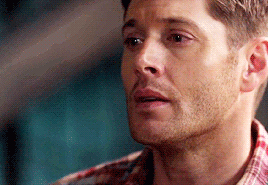
Oh my god!
I gotta say, 13x20 was an ANGSTY FEELSY amalgamation of meta and foreshadowing for the Big Finale Triad of 21, 22, and 23. It laid down S5 tones, key themes, and narrative direction, hoo boy!!!
I’m sorry I posted late! Time-of-month sickness was an interruption, yikes.
I’d like to start with the Dean & Sam final scene, then talk about the major culminating implications this Father-centric episode specifically holds for our beloved protagonist Dean Winchester the shackled child — the Man behind the Mask (which S13 has been a gigantic narrative mirror of) — and the Destiel narrative/Cas in relation to Dean’s arc and character disposition *rubs hands together*
Glynn & Co made Dean’s axel-swinging between communication and miscommunication pretty clear to me in the last scene of 13x20, especially regarding the dialogue that people thought was character regression into Brodependency.
After sleeping on it, I didn’t see the same scale of toxic codependency from seasons ago a la ‘there ain’t no me if there ain’t no you.’ It wasn’t mutual. I saw it as: 1. more from Sam’s end, and 2. Dean’s willingness to protect his loved ones (Sam and CAS, in bold) combined with letting go and the textual acknowledgement of his low self-worth carrying over from 13x05 (the low self-worth he internalized across 99.6798% of his life course).
Firstly, Dabb’s subverting S5.
He put independent Dean in S5 independent Sam’s shoes here, and it’s surely not a coincidence that Dean himself referenced their implosive S5 Michael-Lucifer mess: “Where we were last time we had front row seats”. S5 exhibited Dean’s Holding On vs Sam’s Letting Go, with lost Dean crawling to Lisa’s door and yeah, we know how that prickly-edged story went. It’s finally Dean Letting Go vs Sam Holding On. It’s indicative of S13 faithless Grieving!Sam re: Mary/Jack seeking his own emancipation and finding real introspective purpose away from the codependent strings he’s clinging to. We heard Sam’s “If we die, we die together”. Don’t fret, his current arc is constructed to get rid of this kind of thinking and move towards Faith!
Dean’s prepared to cut the codependent strings — already has via 12x22, and then in 13x05 (albeit in a suicidal grief-ridden manner. Speaking of, 13x20 this time shifted focus to Sam’s risk-taking re: Lucifer and the Apocalypse in itself. Unsurprisingly, we already witnessed this narrative train running in reverse -- early S13 Grieving!Dean and Functioning Sam swapped roles post-13x06 and in 13x11. Man, I am pumpin’ my fists).
Atop the bro dualism, Dean’s behaviour in 13x20 concerned me the most, saddened me the most, and intrigued me the most.
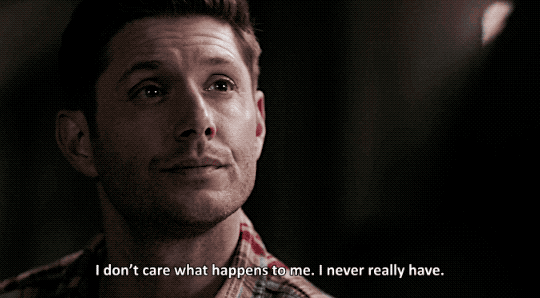
:’(
I may have yelled said that Dean has emotionally matured, eliminated toxic coping mechanisms, achieved an internal balance between his femininity and non-performative masculinity (acknowledged in 13x04; actively manifested in 13x16 onwards x, x), and gained a sense of non-combative communication and understanding (seen in 13x14), yet his low self-worth constitutes the biggest roadblock to his FULL personal growth.
Okay, I know you’ll exclaim: after Cas returned, Dean wasn’t depressed anymore!
Well, that’s accurate and relatively inaccurate. Dean’s low self-worth is the central facet of his characteristic development, and it does have a guaranteed correlation with depression. Yes, you can feel worthless without being clinically depressed, but worthlessness is maladaptive and contributes to feeling depressed --> Dean’s depression.
Dean’s case is a heartbreaking one. He’s been depressed for YEARS. He never really cared about what happened to him for YEARS = our Dean meta textualized in gloomy letters!!
Yes, the single individual -- the canon WIN -- that placed him back on the rails was Cas, his Everything, resurrecting from the dead. Cas’ return drastically mitigated Dean’s severe nihilistic depression (aka his rock bottom nihilistic grief when he lost Cas) BUT it didn’t necessarily fix his pre-existing depression.
S13 depicts Dean -- despite Cas’ bright presence -- as traveling the rails empty. There’s not enough coal to fuel his engine because he LACKS the mental faculties to appropriately cope re: trauma and give up his control. This is why he seems to oscillate between character progression and regression, and he still isn’t 100% HONEST and OPEN about his feelings. He’s keepin’ it in. There’s no healthy psychological unload taking place.
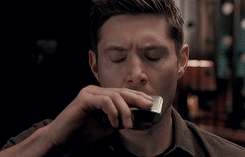
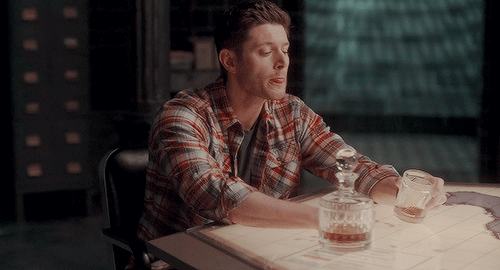
Case in point? Dean’s regressed to drinking the hard booze again; Cas FILLS the negative spaces (as he’s been doing throughout S13). Dean is not disclosing the whole truth -- not saying what he’s genuinely feeling (to CAS. I discuss it x, x, x).
Plus, Dean’s internal worries re: Death, the next apocalyptic war, Cas’ Heavenly plans, and his respective destiny/fate (Death’s “See you soon”) just exacerbate the personal instability he’s experiencing.
And then we observe Dean’s parental duty rearing its head:
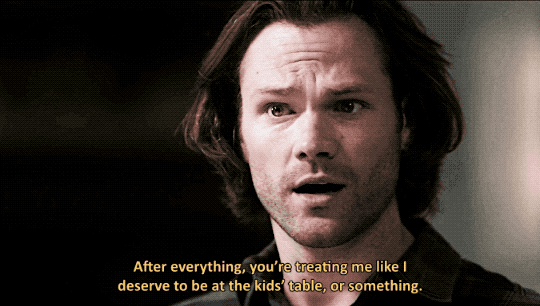
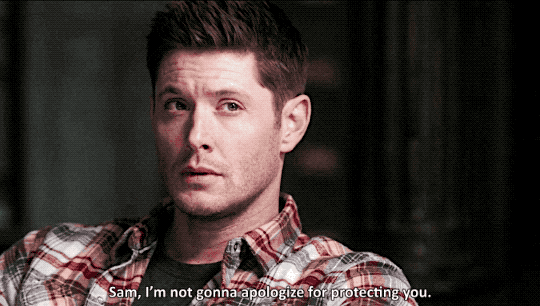
To me this is what reiterated the Brodependency being dismantled in late S12/S13 (12x22 and 13x12/15 in particular). Don’t get me wrong – Dean’s mostly let go. He was willing to leave Sam behind in 13x05 after losing the one person who textually means Everything to him.
Dean’s psyche is at a point right now where he AIN’T okay with Sam’s risk-taking. He questions his little brother’s half-baked plans and sympathizes with the close-to-here manic desperation (again, mirroring S5 and S13 Grieving!Dean), except Dean’s low self-worth puts him in the dark position: I’m doing it, all of it, for YOU (Sam and Cas) since I don’t value myself enough to do it for ME. He further says--

He obviously does, but us, the audience, know--in dramatic irony fashion--that this is NOT Dean’s entire truth.
He values his brother more than himself, and he values CAS more than himself. He cares about what happens to CAS. Nothing Else Matters. And we’re aware that Cas canonically occupies the highest pedestal in Dean’s life, which TPTB absolutely highlighted during Dean’s grieving arc, Cas’ return, and 13x16 onwards.
(In this scene, Dean continues to tell Sam what he’s NOT telling Cas. USE THE RIGHT WORDS.)
Cas is the love of Dean’s life, his Everything, and his Win. I mentioned before that losing Cas a second time would destroy him.
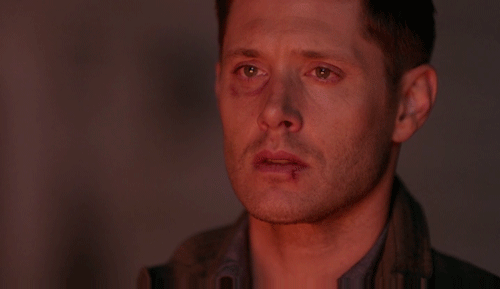
(**Dating 101: Dean therefore cannot establish a truly healthy, mutually interdependent relationship with Cas if he has low self-worth. He’s trying, but his personal losses -- more LOSSES than wins this season i.e. AU!Charlie/Mary/Jack in AU, non-confronted traumas i.e. Cas’ death, and insecurities cripple his ability to give Cas ALL of himself, out in the open!)
Although Dean HAS FAITH (Cas), the decisions he’ll formulate to protect/save Sam, Mary, Jack, and especially Cas aren’t exactly derived from mental stability. Keeping them safe is too paramount to Dean that the choices he’ll encounter could be questionable/dangerous, putting him in the line of (sacrificial) fire.
Sound familiar? It’s deliberately supposed to sound familiar!
Jack, TFW’s Unity/Balance symbol and characteristic mirror, even stated that ‘if he can’t keep others safe, what’s the use’?
Dean will make the penultimate save-the-world (read: save my family) decision ALONE regardless of Sam’s regressive wish to die together. And I wrote that his arc is now DIRECTLY paralleling S11 Casifer & Depressed!Cas’ S11/12 arc, especially (mis)communicative 12x19 --> 12x23 ‘I Have Faith’ Cas. There’s prevalent narrative symmetry in Dean’s arc (intrinsically linked to Cas’ arc).
“You, me, and Sam...we’re just better together” indeed, and this year’s season-ender should unite TFW like last season--unite Dean and Cas--in order to change their fates/defeat Death, but Dean’s decision will be an isolated one --> one that was foreshadowed as he faced expositional Daddy Issues™ Loki by himself. And Dean may not tell Cas, just like Cas hadn’t told Dean in 12x23 about his sacrificial act.
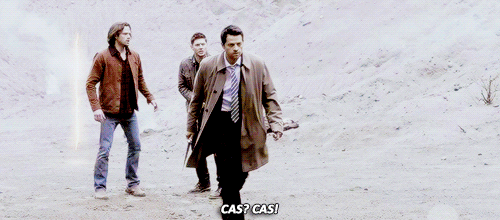
These vastly important storytelling threads ultimately conjoin with “I don’t care what happens to me. I never really have” as the PINNACLE of Dean’s 13-year long characterization; the progressive climax sparking his death/decay so that he can be reborn and revitalized aka THIS IS IT!! Dean’s impending death and self-sacrifice for his loved ones (CAS) = the ultimate catharsis in that S13′s narrative has finally approached the IRL scenario of 13x16 ghost kid (DEAN)’s release from father figure Bad Man -- from the negative influence of all the other literal (Loki, Odin, Lucifer, James Turner) and metaphorical (Asmodeus, Buddy, Michael) fatherly mirrors permeating this season. He’ll LET GO of everything that incarcerated him since he was 4 years old: his Blunt Tool role, control, manipulation, parental abuse and absenteeism, parental duty, the heteronormative patriarchy, and the long-standing trauma slapped on him by Alastair, Amara, and Cain.
He’ll burn the remaining pocket knife of all pocket knives tethering him to his past -- John Winchester x, x He’ll self-transform.
And Dean’s S13 death would fulfill the sacrificial Act of True Love (with Cas holding heavy weight in Dean’s decision for LOVE)--
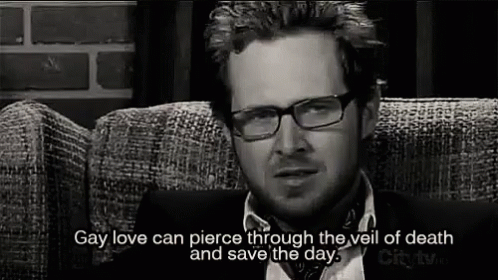
--and S14 Winning Him Back in the subverted flavour of S10. Romance tropes abound!!
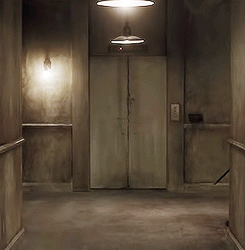
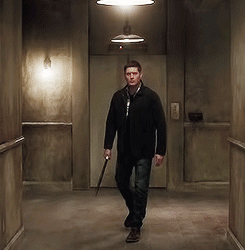
@thetwistedwillow and @sactownbrowns3 both ignited my stomach-churning feels. This is an extremely pivotal visual. The Michael-reminiscent sword and radiant halo-like lights atop Dean’s head? Yeah, set off HUGE Michael!Dean radars. Complete moral dualism with S10 Demon!Dean--selflessness vs selfishness. Free choice (saying yes to possession) vs stolen choice (demon transformation against his will).

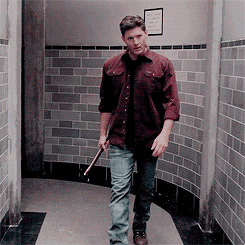
Secondly, as aforementioned, Dean’s harbouring a LOT of traumas he hasn’t mentally confronted, with Daddy Issues™ re: John Winchester (reflected via Dean’s solo faceoff with Loki) as his overarching undealt source of trauma.
Loki tells Dean: “The truth is, [Odin] despised me, but he was my father. I’m sure you understand. What would you do for your father?”
And Dean stabs Loki’s hologram. He stabs the metaphorical father figure who neglected his sons. He stabs another narrative embodiment of John’s ghost, foreshadowing that Dean’s death = John Winchester’s final death. It’s time to deconstruct and conquer his influence.
(Gabriel was an extended mirror of both Dean and Sam, too. Gabe, the little brother whom deadbeat Daddy Chuck never paid attention to. ‘Ah, big bros, right? Always think they know best’ Gabe, who stabbed and killed deadbeat Loki. Gabe, who subsequently ran away from home, was used and tortured beneath Asmodeus’ control, embarked on a revenge trip, and didn’t feel good about it. Dean and Sam themselves knew what it felt like to be manipulated. While it’s true that their traumatic experiences are subjective, they share common Deadbeat Father-adjacent life courses.)
What beautiful and consistent silent storytelling!!
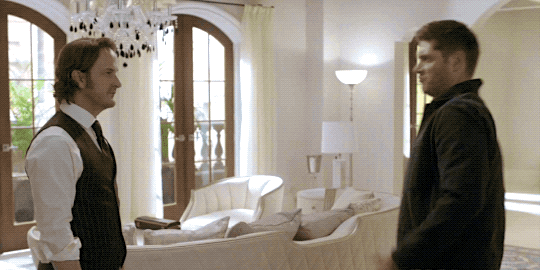
And oh look, narratively associated to this ^^ is the reappearance of Dean’s John-linked BAG OF EMOTIONAL BAGGAGE--

I can’t can’t can’t wait for him to let go of it PERMANENTLY!
And of course, Cas’ death remains his immediate significant source of undealt trauma (same links above: x, x, x)

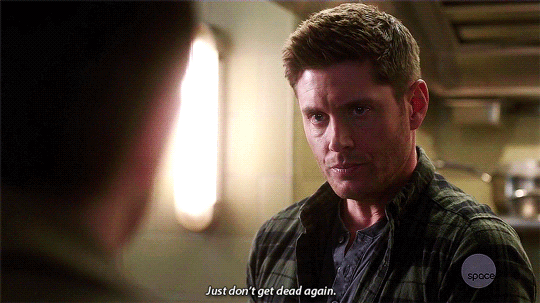
*looks at Dean’s serious, intense, and emotionally laden expression* *clutches chest tight* *blinks away tears*
I additionally wrote something about Endverse!Cas and D/C (mis)communication a few months ago which I feel is relevant again:
And we know HUMAN Endverse!Cas was representative of that, a sad, depressed, and hollow depiction of the wrong choices for the right reasons who festers (AND DIES), in part because of Dean’s wrong choices, and also because of his own consciously uninformed, narrow-minded choices that led to this literal apocalypse of mind, body and soul.
5x04 laid down what Cas (and Dean) shouldn’t become. If both Cas and Dean (TFW) continue to fail in learning their lessons regarding healthy interdependence (where control must become equality; ignorance must become understanding; intransigence must become compromise; stonewalling must become transparency; lying must become honesty; silence must become communication), Endverse will be their life.
Thankfully, they’re learning as of S13 onwards and I’m ECSTATIC. Slow but sure progress (13x15′s conveying the shift), yet they still have to use the RIGHT WORDS.
Endverse!Dean, who never gave up his control to Cas nor listened to him, was himself consumed by the NEED over the WANT and an authoritarian means to an end. He lost everyone. And Endverse posed an ultimatum for Dean (and Cas’ own characteristic progress): keep your control forever, and you’ll have one destination–no growth, no life, no freedom.
Full circle!

Dean Winchester must die so he can live.
And what are Dean’s WINS (plural) by dying? Saving people instead of losing people--saving Mary, Jack, Sam, and Cas. Saving the world. Reuniting his family unit. Interacting instead of performing. OUTING INSTEAD OF HIDING. HIGH DEPRESSIONLESS SELF-WORTH INSTEAD OF LOW DEPRESSIVE SELF-WORTH.
Better yet, Dean will undergo character development in relation to his loved ones (and Cas). With high self-worth, Dean’s capable of learning how to value HIMSELF independently. In turn, without personal obstacles he’ll learn how to sustain HEALTHY interdependent relationships and COMMUNICATION as well as learn how to WHOLLY GIVE HIMSELF to others (Cas).
Tell Cas he’s not expendable, Dean. Disclose the real reason YOU “needed him back”. Expose your feelings, choose Want over Need, and push away your rejection fears! Cas loves you dearly—let him know that his love for you is reciprocated. Nothing but good things ahead!!
Gosh, this post is way longer than I expected—thank youu for sticking to it! Circumstances shall get worse before they get better, and it’s totally necessary to ensure our characters meet the final demise of their prisons.
BTW, I still can’t believe we got a borderline blatant onscreen bi!Dean (and Cas insert) treat!! What’s by is by! Overall I’m incessantly praising Dabb’s spectacular work so far + Glynn and Rich Speight Jr’s craft in this ep!!
Very little sub is left in the text, my friends. TPTB are rendering years’ worth of meta increasingly explicit in S13. I can only HOPE and expect that 13x23/S14 brings us past the Point of Know Return subtextual boundaries and into full-blown textual narrative! Authorial intent EXISTS.
**I know, I know--S14 wasn’t confirmed as the last season and S15 is fair game. The plot accordion, as per usual, re-emerges with the slight overhaul/pullback of characteristic arcs and narrative plot due to season renewals, but I’m Endgame Positive that slow progress is SURE progress. Imho Dean and Cas are so close in saying everything from saying nothing. THE UNSAID WILL BE SAID.
Bracing myself for the last 3 episodes—they’ll burn us in awesome ways!!
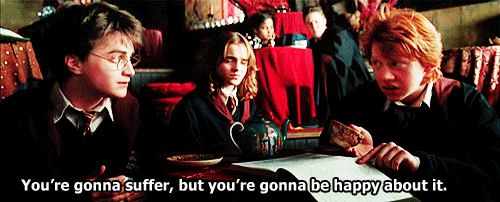
#long post for ts#spn s13#my meta#my stuff#destiel#character development#narrative#endgame destiel#canon destiel#textual destiel#bag symbolism#bags and emotional baggage#13x20#13x23#spn s13 speculation#silent storytelling#IN DABB WE TRUST#supernatural#deancas#parallels#dean is in love with cas#dean winchester#performing!dean#want vs need#miscommunication#communicate before it’s too late#USE YOUR WORDS#tw: depression#dean is bi#john winchester's a+ parenting
210 notes
·
View notes
Text
‘Secret Rooms’ Definitive Edition – A New Century Review

Available on Kindle on Amazon.
Available as an audio series on Bandcamp.
When I first reviewed the original edition of Secret Rooms back in early 2017, I thought it was a solid instalment in this alternate history series of fictional stories. I enjoyed the mix of genres, the variety of conflicts the characters found themselves in, and the balance of humour and more intimate moments where characters went into their experiences with grief. At the time, I saw it as an enjoyable story that is somewhat overshadowed by some of the later instalments in the series which were getting better and better with each book. Having said that, my review for Secret Rooms is still full of the many positives I found in the original edition of the book which make it a great read and/or listen. I stand by everything I said back then, and you can read all of it here.
But things sure have changed since that review. New Century has had two new entries with The Christmas Thieves and Let Them Go, and Secret Rooms has been bolstered with a brand-new Definitive Edition. This new edition adds extra chapters, some re-recorded lines, and just more content that helps this early story in the series stand up with the rest of the impressive entries in New Century. It’s not a radical transformation, but this expansion on the original story makes the narrative feel more complete, more thematically resonant, and just as polished as the other standouts of New Century like Arlington, Tiger’s Eye, and Let Them Go. If you’ve been following me, you’ll know that I’ve been writing up each of the new chapters of this edition which have been collected into a new short-storyline called Weirwood. You can read my detailed thoughts on these chapters here, here, here, and here. What I aim to do with this review is to lay down a string of observations that I noticed while listening to this Definitive Edition and re-experiencing the story of Secret Rooms. If you want a spoiler-free review of the story, the original review absolutely has you covered. If the story sounds like your cup of tea, check out the Definitive Edition, and once you’ve enjoyed it, and you will enjoy it, come back here and we can sit down and talk about the book together.
As I’ve mentioned before, there are moments in this story which seem to take influence from Mass Effect. Encounters are self-contained and varied, making the world of the Reunified States of America feel more alive and unpredictable. There’s also a sense with each of them that, whatever our protagonists decide to do, there are half a dozen other possible outcomes that might have occurred if they had gone left instead of right. Characters discuss their options, and the different suggestions will rarely be unreasonable or entirely without merit. There’s no clear answer to how each of the problems they’re confronted with ought to be resolved, so the story of Secret Rooms is very much about a group of people trying their best to do the right thing and help as many people as possible. A lot of the time, that means making choices that aren’t guaranteed to lead to the best outcome. A lot of the time, they simply have to take a leap of faith and hope that it will be for the best.
Speaking of Mass Effect, you could summarise parts of Secret Rooms as a charismatic badass female leader recruiting a number of striking personalities in order to accomplish a seemingly impossible task. Yes, I am comparing Annie Oakley in New Century to FemShep, and I find her sentiment that the world isn’t going to get any better unless we step outside and make it better inspiring. In contrast to how Arlington pitches Annie against unpredictable and overwhelming forces that render her practically powerless, Secret Rooms shows Annie in her most impressive light. What makes the story of this book as compelling as it is then is that, after Annie is established to be the ideal image of a Cartographer, she passes the responsibility of decision-making to Abigail for the duration of their excursion together which makes up a good portion of the narrative. At first, this is done to give Abigail a taste of what it’s like to be confronted with a difficult situation so that she can appreciate what is required of being a Cartographer. Once they arrive at the House of Versteckt, however, Annie is forced to leave James and Abigail to fend for themselves as she rides to gather reinforcements. This is James and Abigail’s greatest test, and after making it through, they’re changed forever. Secret Rooms is the story of these two capable yet inexperienced characters and their journey to find their own way as they set out from their familiar home and are cast into completely uncharted territory. Having Annie play an important supporting role as this accomplished Cartographer supervising these two new recruits provides a safety blanket for the first part of the story, but once we enter the final act and the two are left alone, our protagonists seem unbearably vulnerable.
I’ve already discussed the accomplishments of the additional chapters as an emotionally affecting story-thread within this new edition of the book, but it must be stressed that these chapters aren’t just a tacked-on short story. The new chapters are integrated into the existing structure of Secret Rooms seamlessly, and they even reinforce some of the key story-beats and themes of the original text. After we’ve seen half of the people of New Athens leave for dangerous lands in spite of Abigail’s best efforts to convince them against this course of action, we transition back to the story of James and Abigail’s past at Weirwood. The first part of this section has James relate a memory he had had of Nathan telling him that the best way to convince a wondering chicken to come to you was to pretend you weren’t interested in it and didn’t want it. By placing this immediately after the chapter where we see that Abigail couldn’t get these wandering civilians to come with them, the audience is invited to form a connection between the two moments separated by time. Is it possible that Abigail would have found more success if she had not made it clear that she really wanted the people of New Athens to come with them, as Nathan suggests you avoid coming on too strongly with the chickens? Or could it just be that there really is no way to convince something out of your control to be tamed when their mind is set against it, so all you can do is steer into it and act like you never even wanted it in the first place? Either way, I appreciate how the added chapters reinforce moments from the original story in little ways like this.
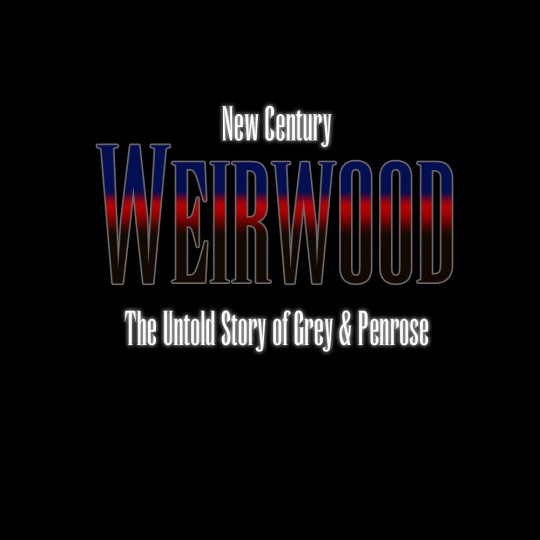
One theme in particular that becomes much more pronounced in this newer edition is the concept of human relationships between a group of three people who love each other. Abigail and James both share a personal connection with Lucy and with each other. For a time, they are content as this group of three that has somehow found a happy balance. Even when things get messy and complicated, the individual pairings we see, first with James and Lucy, then Lucy and Abigail, is presented as something sweet and beautiful, even if it does lead to the third member of the group feeling hurt in each case. It’s compelling drama that takes this situation seriously – you certainly couldn’t accuse this plot thread of being a clichéd love triangle, as it’s much too well-observed for that. It taps into a very human experience, and while part of you wants to blame someone when things go wrong, the writing ensures that you understand why things happen as they do, making it an intensely bittersweet story, even before the tragic ending reveals itself. As I listened through the Definitive Edition and reached Part Four, I realised some of the parallels that can be drawn between these three and the story of Krieger, Greta, and Charlotte. The Definitive Edition presents us with two groups of three, each of them being made up of two female members and one male member, and each group is made up of people who share a romantic love for one another. All of these people are in love with not just one person, but two people. And, sadly, the two groups are also alike in that they have each lost one of its members, and each group mourns the loss of the sensitive soul that they so dearly miss.
It could be that these similarities are there to make us notice the connection and then ask what makes the two trios different from one another. While Lucy, James, and Abigail were young, practically children when they felt this love for multiple people and were struggling to process these feelings, we see evidence that Krieger, Charlotte, and Gretta managed to maintain a polyamorous relationship for an extended time as adults. This makes me wonder what might have been if Lucy was still alive; could the three of them have worked things out and still be close? Is there one reality where Lucy is still alive and the three of them enjoy a long-term polyamorous relationship with one another? Then again, the trio from the House of Versteckt certainly isn’t a wholly perfect example of a healthy polyamorous relationship, at least in respect to the awful thing that Krieger does to Charlotte. The final chapter does a brilliant job at getting you to be sympathetic towards Krieger even as he discusses the process of killing one of the women he loves and his reasoning for doing so. His logic for why it’s too dangerous for Charlotte to continue as she is does seem sound, and you can tell from the words and Matt Wardle’s emotional performance that this is killing Krieger. Even so, in comparison with Abigail and James allowing Lucy to be free and go out into the open world as they let go of her, Krieger sealing Charlotte away and making the decision for her that her life needed to end is a horrifying violation. If you’re looking for evidence that Krieger’s actions have had lasting negative consequences that Charlotte herself did not want, look no further than the fact she appears to Abigail as a ghost, her spirit being trapped by what Krieger did. The dynamic and interconnecting relationships of each trio is touching, heartbreaking, and fascinating to see unfold as the narrative progresses, and the Definitive Edition makes this one of my favourite aspects of Secret Rooms.
There’s also a point of connection between Lucy and Krieger due to them both having conversations with the main characters about the cosmological and their place in the wider universe. When Krieger delivers his lecture about Pandora’s Box and the theory of multiple realities, I couldn’t help but think of Lucy and James sitting together looking at the stars all those years ago at Weirwood. A crucial difference, however, is that while Krieger sees the scope of reality and the potential Lovecraftian horrors out there and thinks of the fearful implications of that (despite his insistence that he would still open many boxes and explore many realities), when Lucy considers her small stature in the scale of the infinitely greater universe, she sees the hopeful side of things. If nothing matters, then everything matters, as she says. I appreciate having these two moments of introspection from different characters and seeing their different conclusions on, more-or-less, the same subject. It opens things up, and makes me even more contemplative than the original edition had already made me.
On a similar topic, the starry eyes, both those that Gretta is revealed to have and those that Abigail and James acquire after touching the orb, made me think of Lucy and her stars, especially as James describes looking into Gretta’s eyes like looking up into the starry sky at night. Perhaps this would be the only way to describe such a concept, but it nevertheless felt like a deliberate connection between the eyes and this important memory of Lucy. My interpretation is that this connection is there to make what Abigail and James see when Krieger and Gretta leave through the Wind Door and Gretta’s eyes are revealed feel even more like something beyond their world. This memory of Lucy and the stars is like an ethereal moment which is forever out of reach for James, so the connection between this moment and seeing Gretta’s eyes makes it feel like we’ve stepped beyond what we can understand or touch in the physical world that we know.
Listening to Secret Rooms this time around, I realised how much of a blow it is for James to lose one of his eyes. The original draft already did an effective job at conveying how much the loss of their eyes will affect James and Abigail through the writing. But because we get that added time with the two of them at the start of the Definitive Edition that shows us these characters from an early age, I feel the magnitude of how much of what James relies on to get by will be irreversibly affected by what he’s lost. We know how much he needs his powers of observation to get by in his day-to-day interactions with people and his duties as a doctor. So much of his identity has been built around his sharp eye and his close attention to detail. Now that his sight is less than what it was, these parts of his identity are affected considerably, and you can imagine how that would make James feel unsure of who he is now that he’s no longer that version of himself.
The Definitive Edition of Secret Rooms is a terrific success. I enjoyed this story before, but with the added content that this new edition brings, there’s more time with the characters which makes the later sections of the story more meaningful, and the themes are bolstered by the story thread with Lucy which invites us to draw parallels between what happened in the past and what we see in the present. On top of that, the story of Lucy and Weirwood is just a really emotionally affecting story about past regrets, achingly beautiful memories, and the deep connections between three people who loved each other. Maya Santandrea is a wonderful Katherine Holloway and I’m sure there are dozens of little audio adjustments and small technical edits throughout the audiobook which make the whole thing even more polished than it already was. Tiger’s Eye and Arlington are still at the top of my list of New Century stories, but through a combination of coming to appreciate it even more on a second listen and some really well-implemented additions to the text, Secret Rooms has climbed up high to be yet another of the really close favourites that the series has in spades. Depending on my mood, I could very well see myself saying that Let Them Go, The Princess Thieves, or yes, Secret Rooms is my favourite New Century story.
Final Ranking: Gold.
Striking an impressive balance between a fun spirit, nail-biting tension, and emotional drama, Secret Rooms takes you through a remarkable number of different genres and tones, and it makes all of them work. This was already a good story. Now it’s even better.
Join me in the new year as we dive into all-new territory with New Century’s most ambitious story yet, SteamHeart.
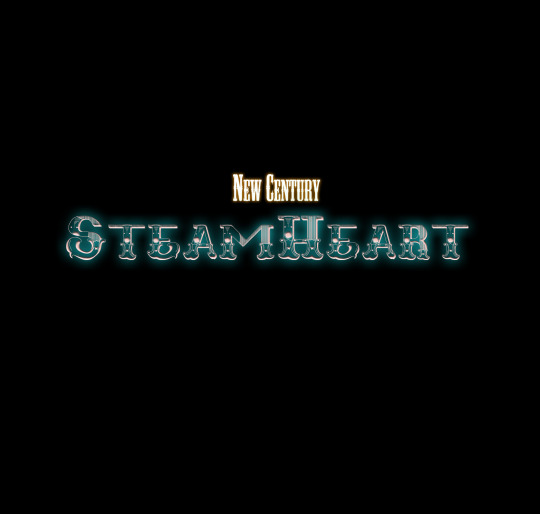
#The Inquisitive J#review#critic#narrative#narrative analysis#fiction#audiobook#audio drama#fictional podcast#books#alternate universe#alternate history#alternate history fiction#new century#new century multiverse#the new century multiverse#secret rooms#secret rooms definitive edition#the inquisitive j reviews
2 notes
·
View notes
Text
BlacKkKlansman: Double Consciousness & Extremist Identities
I saw BlacKkKlansman last night, and I’m still trying to properly breathe around the cold stone it left in my chest. I’ve been thinking about it constantly, and whenever that happens I always feel the need to write some sort of analysis to try to articulate why I’ve reacted so strongly to something. So, here’s my half-baked BlacKkKlansman review.
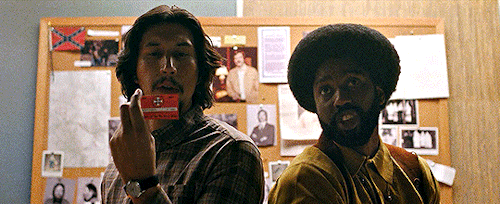
First things first, I’m white. Of course, that affects the way I view the world and whatever art/media I choose to consume. I fully recognize that my experience and takeaway from this film are likely very different from those of a viewer of color. And sure, I can say that I try to be progressive in how I live my life and I took college courses on race politics and minority marginalization, but at the end of the day, this is a film about black voices and black equality and those are topics I have no right to discourse on. So please, if something I write below seems misguided or uneducated, please let me know so I can self-examine and adjust.
First of all: The simple fact that this movie had such an effect on me as a white viewer. I was in a crowded movie theatre, with an audience of diverse age and race, and never in my life have I felt such a powerful moment of silent, unified shock when the credits started. The ending left every single person speechless. White privilege means that when I read news articles or books about institutionalized racism in our country, I have the option of closing the book, walking away and thinking about something else for a while. Not the case whatsoever with this movie - It didn’t discriminate in its devastating impact. While I’ve read about Black Power ideologies, there’s always an aspect of such movements that are designed not to be fully understood by those outside of it. These are not for me. This seems as intentional as it is justified. Black communities are excluded from so many mainstream ‘white’ narratives or locuses of power, these movements are the sole spaces that belong entirely to them and which they entirely control. They are designed to alienate, the same way these communities are alienated from so much else in society. However, BlacKkKlansman seemed accessible to a multitude of viewpoints and cultural/racial positions. The film does not strive to tell the audience how they should feel, but leaves elements of interpretation up to the viewer by presenting a chorus of voices, rather than a single one; By presenting multifaceted characters experiencing conflicts of identity - Rather than a single protagonist with a single political message. This is certainly not to say that a film is only good if it panders to the understanding of white viewers, but in this case I was impressed by the multiplicity of narratives and perspectives that were portrayed.
What’s so thought-provoking to me about the film was the decision to tell the story from the position of the undecided and conflicted center. By following Ron and Flip’s investigation, we watch each character grapple with the opposite sides of extremism. While Flip has to ingratiate himself with the Klan members who would revile his Jewish heritage, Ron has to spy on his own community at Black Student Union events as they call for war against the police. Both characters must play roles in order to pretend to fit into the groups they look like they should belong to. In Flip’s case, feeling threatened and despised by the Klan’s ideals makes him re-evaluate the meaning of the Jewish identity he never thought much about. For Ron, he feels torn between his loyalty to his people, and to his own hard-sought and prized work as a policeman (an institution equally reviled by Patrice and Klan members). Ron and Flip both wear masks, and their feelings of separation from “their” respective communities makes them each consider the conflicting identities within themselves.
Aptly, Patrice speaks to Ron in one scene about double consciousness. She questions whether it is possible to be both a black woman and American citizen. To her, putting her country first would be a betrayal to her black identity. In juxtaposition, the Klan members dress up their intolerance behind the values of “America first” (I can barely describe the chills that went through me when the Klan members all started chanting it.) Ron’s struggle throughout the film is exactly this - His determination to be both a black man and a police officer. He and Patrice disagree on whether it’s possible to change a corrupt system from within, and the movie leaves ambiguous how much Ron succeeds in this front. It’s crushingly infuriating when, towards the end of the film, Ron is himself detained and beaten by policemen who don’t believe he’s an undercover cop. But shortly thereafter, he enjoys a triumphant entry into the police station where all his white colleagues congratulate his work and embrace him. The scene when he calls David Duke to reveal his identity with his three colleagues giggling on either side of him is downright charming in its camaraderie and gaiety. It looks like acceptance; But tempered by the fact that all his hard work on the investigation was ultimately scrapped in the end.
These themes of double consciousness and ambiguity permeate the film, and lend to its impactful success. Split-screen parallels are presented between Klan and Black Power movement meetings - Certainly not to equate the two, but to show in stark, unmistakable terms that these are the polar opposite, yet intimately interrelated effects of racism. This is how distantly racism divides our country - And how it leads to beliefs on either side that people will kill for. Towards the climax, a Black Student Union meeting listens to the horrific history of a young black man being brutally lynched, while the Klan members cheer and applaud a scene in Birth Of A Nation depicting the hanging of a black man. Neither side exists without the other to perceive it as a threat - And both stand firm in their respective beliefs that their hatred of the other side is justified.
Yet, the film wasn’t the story of the Klan, nor of the Black liberation movement - It was the story of the two men caught in the middle, looking for footing on quickly-shrinking ground between the two sides, as their mutual hatred brings the two warring sides to an inevitable conflict. It is the same story of many modern viewers, wondering how in hell we’ve come to the present moment with “Black Lives Matter” on one side and Trump proclaiming “America First” on the other - with not an inch of common ground or even common perception between the two.
Although I hope most viewers would intuit which side is truly more justified in their grievances, a strength of the film was its balanced, rather than caricatured depiction of the Klan members; Who believe that yes, they live in a racist country - “An anti-white racist country.” The chilling brilliance in the depiction of David Duke was how harmlessly normal he first seems - Cheerfully spouting off phrases like “you’re darn tootin’“ on the phone to Ron and ending the conversation with a chipper “God bless white America!” This is exactly how ideologies of hate become disguised as civilized, mild-mannered “values.” David Duke has given up the flashy title of “Grand Dragon” for the more innocuous “National Director” (or something to that end). The first time he goes undercover, Flip is quickly admonished never to call the Klan “The Klan,” but rather “The Organization.” In a conversation between Ron and one of his superiors at the police station, it’s even discussed how a high-ranking Klansman might have the long-term goal of placing “one of their own” in the White House, after they’ve disguised their intolerance and bigotry under the empirical rationales of policy. It’s one of the most painful moments of the entire film.
Yet, while Flip has to endure the Klan members’ talk of killing black people, and Ron hears Kwame Ture speak about race wars with inevitability, another stroke of the film’s thoughtful genius is the choice of individual who actually enacts violence - Felix’s utterly apple pie looking housewife. She looks like the plump, harmless woman you wouldn’t want to be in line behind at the grocery store because she’s likely to have fifteen coupons. She is the last person you would expect on sight to leave a bomb at the house of a young black woman. And yet, this is another powerful message: How the vulnerable and susceptible can so easily become radicalized. I certainly don’t have sympathy for her because she’s an adult who made her own decisions; But I’m also aware of the way her Klansman husband manipulated her into becoming what she was, and it’s an extra layer of nuance I appreciated.
Finally, I’ll wrap this up on a personal, perhaps silly, note. There were multiple layers of this film that really disturbed me, and it’s taken me a good 24 hours to put my finger on this last one: I’m not sure I enjoyed Adam Driver as Flip. Don’t get me wrong here, I’m all over that shoulder gun holster look and he looked 500% finer in flannel than any man has a right to. Also, I’m not sure I would feel this same discomfort if he’d been played by a lesser-caliber actor, or one who I don’t have such an attachment to. But I realized that on an instinctive level, it upset me to see his face under a Klan hood, and to hear him say vile racist comments. Rationally, of course I know that A) He’s acting, and B) Even his character is acting, but Adam’s an utterly convincing actor, playing an undercover detective who’s very good at his job. Maybe both his and Flip’s performances were too good. I asked myself why it didn’t bother me the same way to hear Ron spout racist bullshit on the phone. Part of it is because he isn’t played by an actor I happen to deeply respect and admire, but there’s more to it than that. There’s a passage in the NYT review that got as close to my nebulous discomfort as anything I could express:
"The most shocking thing about Flip's (Adam Driver's undercover detective role) imposture is how easy it seems, how natural he looks and sounds. This unnerving authenticity is partly testament to Mr. Driver's ability to tuck one performance inside another, but it also testifies to a stark and discomforting truth. Maybe not everyone who is white is a racist, but racism is what makes us white.”
Adam’s performance as Flip is discomfiting because it shows how easily a white person can take up the mask of extreme bigotry and intolerance, and how easily they can be perceived as supporting a hate movement, regardless of their true internal ideologies. I know Flip doesn��t mean the things he’s saying, but he’s damn convincing because he looks the part. His whiteness paired with his words - regardless of whether they’re genuine - is powerful and terrible. And racism is what lends him the ability to put on that convincing mask. And if racism is what “makes us white,” Adam as Flip makes me wonder if I could do the same. If, for whatever reason, the situation was such that I had to convince someone I believed in these things... Would I surprise myself by finding that I’m capable of saying things equally terrible? Is this a role that every white person is capable of, at a certain subconscious level, because of systemic racism and implicit biases?
In conclusion: This movie has fucked up my life. It’s genius and I think I need to see it again. (If I can stomach it...)
14 notes
·
View notes
Note
Part of me thinks JJS2 didn't want to acknowledge they'd majorly dropped the ball on race in S1, so in S2 they amped up the "Jessica is a part of a minority group" aspect, had a black woman say "you people," to turn the narrative even further away from Jessica's own white privilege, and destroyed Trish, who was a viable target because she wasn't a traumatized white woman like Jessica - she was a RICH white woman. And they were desperate to avoid their fuck-ups so they made Patsy a patsy.
okay, so this turned into a long, generally incoherent rant that starts with “this show absolutely fails at dealing with race” and ends with “wtf were they even trying to do with trish’s story,” and it should probably be separate posts or better yet just not posted at all, but it’s all generally related to this ask, so whatever. it’s a mess, i have a lot of confusing thoughts, ignore me.
rather than acknowledging the mistakes of s1 regarding race and trying to course correct, the show definitely seemed like it decided to double down. before the season started, as it was becoming clear they were going to do this “prejudice against powered people” thing, i was really weary about how they would handle it, and apparently my instinct was right.
to start with, it felt kind of pulled out of nowhere. realistically, sure, people would be weary of powered individuals, but it hasn’t really been fully built into the fabric of the mcu or the netflix mcu as a realized form of bigotry. it was also really only a thematic element in the first half of the season, and they made no effort to really explore it and its implications before they tossed it out and changed gears. it was just there to be used as a device for conflict and drama.
and it’s such a ridiculous thing when you only have one powered person in the show that’s experiencing that bigotry and she’s a skinny white heterosexual cis woman? like, the most direct parallel for this wasn’t misogyny or homophobia, but racism, and they didn’t try to tell multiple perspectives about it. having a black woman say “you people” at jessica was the most tone deaf bullshit, like, i could not fucking believe it (and then they later killed her off in the most disposable way, which is a whole other issue, and something this show has done repeatedly). they had oscar, a moc that had been in prison (of course), start out the same way, seemingly expressing bigotry and getting “righteously” called out for it by jessica. then there was pryce, another moc, aggressively going after jessica, trying to steal her business, calling her an animal because of her anger and powers, and he “never takes no for an answer” and jessica gets to be like “how rape-y of you” in what was supposed to be a moment of #femaleempowerment. but it just feels like white lady empowerment at the expense of poc.
but hey, gotta pile on to show how very oppressed jessica is in every aspect of her life, right? which, yes, she has absolutely been oppressed and violated and traumatized, and that is so important and real and should never be diminished, but the show didn’t attempt to contend with the ways she’s also privileged and the ways she’s been able to use it to her advantage and having her acknowledge it (including the fact that having powers, being able to protect herself, is an incredible privilege instead of only the awful burden it’s been portrayed as and she’s always interpreted it as). i probably wouldn’t have even said they’d need to explicitly deal with this under other circumstances, if they were focused on telling a different story, but they’re the ones that decided to make analogies to racist prejudice and have poc express it towards a white woman, so they put the expectation on themselves to tell a nuanced story about oppression and privilege and intersectionality, and they didn’t do that at all. they clearly weren’t actually interested in talking about prejudice in a serious, meaningful way.
but here’s the even bigger issue: the show tries to present itself as being feminist, but it can’t be feminist when there are no women of color in main roles or even supporting roles. it makes no effort to tell the stories and perspectives and experiences of woc, and that is an absolute failure. it’s inexcusable that they made no effort to fix this. it absolutely doesn’t help that the woc that are actually present in small roles keep getting killed off unceremoniously. i had some hopes when i saw that they had females directors that actually included some woc, but i don’t think they have any in the writing room, and that matters SO MUCH. it makes such a difference, and they could’ve probably avoided so many of these missteps if they just had other voices represented in the creative process. i just saw a headline with melissa rosenberg where she says, “oh yeah, i totally agree with the criticism we don’t have enough women of color,” okay, except this is not a new criticism, people were saying the same thing after s1, so if she agrees with it and cares about it, why didn’t she do anything about it while they were making s2?
the show has sort of attempted with men of color, in that they actually exist in the cast, but it doesn’t handle them well at all, some of which i mentioned before. then you’ve got malcolm. the only lead character of color in s2. he was set up to be the moral center of the show, but there was no real follow through. he was ultimately treated like an afterthought in most situations. he just? disappeared? constantly? when shit went down? i lost count of the number of times i was like, “umm, where the fuck did malcolm go? is he all right?” and the characters around him were pretty consistently awful to him. jessica almost always treated him like shit. his relationship with trish was a train wreck they both kind of contributed to, but trish turned on him pretty epically, and the emotional fallout for him wasn’t really dealt with. and the writers told his “proxy addiction” story in the laziest, grossest way possible (sex? really? that’s all they could think up? and then to use it as excuse to have him treat women like they’re disposable and faceless?). they just clearly have no respect for him.
it’s such a mess, and s2 was probably worse than s1 in this regard, and there’s no reason it needed to be. this isn’t an impossible thing. when people tell you, “hey, you fucked up. this is how,” you don’t double down or pretend it didn’t happen, you listen and you do better. this should be a show for everyone, not just white women.
turning to trish, since you mentioned her: i’ve mostly tried to avoid post-s2 reviews, but one of the few i read described her character arc as a critique of the white savior mindset. i highly doubt that’s what the show had in mind. as we established above, careful thoughtful commentary about race is not this show’s strong suit, and writing a critique of the white savior mold wouldn’t even occur to them. i could kind of see where the reviewer was coming from, there were some flavors of white savior-ism in trish’s behavior, but they had to pretend she had never experienced an ounce of hardship in order to make it fit. this was basically the conclusion: “trish is rich and has a family and could never under poor traumatized orphaned jessica’s life.” nevermind that money doesn’t stop you from being abused and traumatized, that a family member was her primary abuser, and that living in poverty and wanting money was the motivation for her abuser to sell her out. this take also ignores the thing driving trish the most. it wasn’t “i want to help people, and they should listen to me because i know best” or even “i want to be special, i want to matter.” it was “nobody touches me anymore unless i want them to.” she was tired of being the victim, of never feeling safe. that’s why she wanted powers. it was muddied by the writing, but it really is as straight-forward as that.
i think trish being rich has likely had some influence in the audience diminishing how she was violated and abused in most every kind of way (physically, emotionally, sexually, financially), but i definitely don’t think the show went after her for being a rich famous white lady as a cover for its various racial fuck-ups. i don’t think the show even really tried to contend with or acknowledge her rich white privilege anymore than it tried to contend with jessica’s privilege. if anything, it tried to do the opposite by showing her to be belittled and demeaned and disrespected by everyone around her, similar to how they were upping the ante on jessica’s oppression by having her face bigotry about her powers. granted, it’s clear the audience had an easier time relating to jessica (probably partly due to the money and fame aspect again; also partly because the narrative backed her up more: for instance, the dynamic of having trish envy the privilege of jessica’s power, but the show seeming to say “oh, gosh, trish just doesn’t understand it’s not a privilege at all, it’s a terrible burden” even though that’s kind of ridiculous, as i mentioned earlier). the execution was shitty, but they were definitely still trying to show that trish’s life was not good and people treated her like she was nothing and worthless in a way that paralleled jessica’s treatment.
tbh, rather than punishing trish for being rich or whatever, i sometimes got the vibe they were actually punishing her for daring to have ambition, but that probably wasn’t on purpose, just an unfortunate implication of the way they treated her in general. at first, i’d assumed they were trying to tell a story about addiction and the ways it can destroy your life, and they just sucked at handling it with any kind of thoughtfulness, but now i think that’s being too generous. they didn’t even really try to grapple with the reality of her addiction and mental illness, so much as use it as an excuse to make her more unstable and put her in a position where she’d keep escalating things.
i read an interview before the season dropped where melissa rosenberg talked about female anger (or, as the reality of the show is, white female anger), and anger definitely was a theme for all the female characters. if you recognize trish’s main motivator as mentioned above (protecting herself from further abuses), you can see where it fits into this theme, and that it wasn’t just senseless anger and was driven by vulnerabilities and never feeling safe. so, i don’t know, i guess trish’s story was maybe intended to be about an abused woman finally being so goddamn fed up with victimhood and disrespect and belittlement that she decided to take what she needed instead of quietly waiting for other people to acknowledge her humanity and treat her accordingly. that she finally said “fuck it” and tried to find her own power and become her own hero. except, if that was the story, the way it was executed was, wow… exceptionally awful and not remotely clear and not at all done in a positive way. a storyline like that could’ve had the potential to be powerful and affirming and perhaps empowering (once again, for white women at least), but that’s not the story they ended up telling.
like, i honestly don’t get what i’m supposed to take away from it. they seemingly gave her what she was after, but they spent the entirety of the season shitting on her and had her destroy everything good in her life to get what she believed she needed, which was really just to feel safe. what’s the point here exactly? you do you boo and fuck everybody else because it’ll pay off? don’t have dreams and ambitions for yourself because they’ll make you heartless and selfish and you’ll hurt other people? the desire for power always corrupts even when you’ve been a victim and just want the power to protect yourself? trauma doesn’t go away and can make you do terrible self-destructive shit that you think is helping you but actually isn’t? drug addicts are awful, amirite? what. are. they. trying. to. say?
#anonymous#replies#my thoughts about s2 are a constantly shapeshifting shadow monster#and it's hard to settle into any specific feelings that aren't just 'honestly fuck the writers in general and m rosenberg in particular'
11 notes
·
View notes
Text
Assassin’s Creed: Origins first impressions
Yes, once again it’s time for me to play 20 hours of a game and only be able to give a ‘first impressions’ review, because in this day and age if you’re not able to play a game like a full-time job then are you even playing at all?
I must admit though, for all their flaws as a developer and as a publisher, Ubisoft have, for the last few months at least, given me some of the most consistent gaming enjoyment that I’ve experienced in a while, and it’s due in no small part to the marked increase in quality in their recent releases. It started with Far Cry 5, which I will talk about once I’ve finished it, and continues with Assassin’s Creed: Origins, which is easily one of the top three games in the series.
However, (and we’re talking about Ubisoft here, so of course there’s a ‘however’) there’s something I want to talk about first, and that’s a little thing I call the ‘Ubisoft Enjoyment Curve’.
If the title isn’t self-explanatory enough, the UEC is a visual representation of my enjoyment when playing a Ubisoft game, and it’s a pattern that is consistent among most of their games in most of their franchises. If one were to do a shitty MSPaint drawing of it, it would look a little like this:

This particular mock-up pertains specifically to AC games, but generally speaking, the UEC tracks a boring tutorial followed by a sharp increase in enjoyment as the world opens up, followed by a plateau when one starts getting into the repetitive gameplay loop. This is followed by a sharp decrease in enjoyment as the loop gets tedious, ending on a low as the final battle underwhelms. My experiences with Ubisoft games tend to follow this exact same pattern every time because the company consistently manage to do certain specific things very well, and certain specific things very poorly. For example, no-one designs an open-world like Ubisoft. While the world of, say, The Witcher 3 is a stunning place filled with gorgeous visual detail, it’s still a collection of discrete zones that can only be travelled between via loading screens. Origins, however, is one enormous, stunning, and SEAMLESS representation of Hellenistic Egypt, and somehow it performs like a dream. When the game first offered me a mission to leave the starting village of Siwa and travel to a different city, I finished everything there was to be done because I was convinced that, like Assassin’s Creed 2, for example, I’d be transported to another self-contained city sandbox, cut off from the rest of the world. So imagine my surprise where I realised you could just ride from one end of the country to the other on horseback, and as soon as I was loaded into Alexandria, I could turn right around and walk straight back to Siwa if I wanted to. You can gaze across the deserts surrounding Giza and see the glorious lighthouse at Alexandria towering on the horizon miles in the distance, and if you want, you can make a beeline for it and rarely encounter stuttering and pop-in, with nary a loading screen at all. This technical sorcery is one of Ubi’s greatest strengths as a developer, and although, for example, Black Flag had attempted something like this in their open world, the fact remains that that world is a collection of islands, lacking even half the detail and landmass featured here. Even the most recent game before Origins - Syndicate - took place in the city of London alone. A large city, but much less a ‘world’ and more a ‘zone’. So once one slogs through the grind of the mandated Ubisoft tutorial (as if you’re not just playing practically the same game as you were ten years ago), the enjoyment spike that comes along with exploring the expanding world is dramatic.
But then, after a few hours of running round on an exotic virtual holiday, they hit you with the god-awful present-day missions. Now it’s not that I object to the meta-narrative - failing to adequately follow-up Desmond Miles’ storyline is actually one of the series’ greatest mistakes, in my opinion. The promise of that story, and in particular (SPOILERS) the stunning and fantastic anti-climax for Ezio Auditore at the end of his life’s search for the secrets of Eden, as the Ancients delivered their message through him and over hundreds of years of time to Desmond, was one of the main reasons I was so excited for the follow-up entries following Ezio’s retirement as a character. But it’s specifically because they’ve failed to give the player any reasonable incentive to care about the meta-narrative that these missions are so unbearable. I mean, there’s also next-to-nothing to do in them, but it’s unsurprising that a lack of compelling storytelling begets a lack of compelling gameplay. I genuinely think that they could have thrown that shit out entirely with this entry - I would have been more relieved than anything if they had - and while I can’t comment on how this particular story develops, there seems to be little, if anything, going on as far as I’ve played. It’s more engaging than the confusing, entirely cutscene-based meta-story of Syndicate, but still, the present-day portions of Origins that I’ve played so far take place in a tiny, relatively featureless environment that offer little more than an annoying distraction from the true wonders of the game.
After leaping back into the past, however, it isn’t long before the comfortable familiarity of the AC formula and the wonder of the game world begins to offer diminishing returns. Because once one has explored enough of the map, it becomes pretty clear that whatever changes Ubisoft have made for this entry are ultimately pretty superficial - Egypt may be beautiful to look at, but in many ways it’s like the pre-rendered backgrounds of old in that there’s little by way of interactivity here. At its core, this Assassin’s Creed game is fundamentally the same as that Assassin’s Creed game, and you’ve probably got another 50 hours ahead of you before you’ve finished with it. And while this plateau in enjoyment can hold out for 5, maybe 10 hours, eventually, always, the repetition of the gameplay and the lack of true content always gets the better of me, and rather than investing in what I’m doing, I start enjoying my time less and less. I stop listening to what the characters have to say and just perform side missions by rote, and I’ve noticed that, for all the talk of Origin’s side-missions being more developed than in other AC games, this is only superficially true, and it still falls into the old trap of cut-and-paste content. On the surface, it would like you to think that the old dog has learnt new tricks, but when you find yourself unlocking a cage and carrying a captive out of an enemy camp for the twelfth time you’ll see that Origins still embodies some of the longest-standing flaws of the series as a whole. And it’s all the more annoying because the repetition in the side content doesn’t necessarily have to be such an issue, but as always, the busywork still ends up taking up an enormous amount of your time in-game, vastly outweighing the time spent engaging in any kind of story-related content, and it saps away a lot of the life the game might otherwise have.
So, with that said, what does the game do right?
The story begins in media res, and it does a fairly good job of catching the player up on the history of the main character - Bayek - and why he has you doing the things you’re doing. While it might initially felt like I’d skipped past interesting parts of a bigger story, I can’t help but feel like there is so much more to be revealed that I don’t know about yet, and this parallels the journey of Bayek himself, who begins the game equally ignorant as to how deep the conspiracy he has found himself embroiled in goes. For what I’ve seen, the game takes a rather hands-off approach to telling its story, as opposed to, say AC2, which leans into its historical figures and has a lot of fun with its fictionalised version of history. Origins opts instead to spend as little time as possible explaining its story via cutscenes, and throws the player into the doing rather than holding them up with the telling, and in my opinion it could have afforded to play with its history more. But again, I’m not sure how much of the story I’ve played so I can’t comment on how this changes later on.
The time period of the setting is absolutely inspired as well, and depicts Egypt when it was the point of intersection of three diverse cultures - the Greek, Egyptian, and Romans all meeting as civil war stirs between the armies of Cleopatra and her brother/husband (yeah) Ptolemy XIII. This incredible time in history lends the game an immense diversity of both architecture and people, and the player gets to experience the joy of interacting with these, and playing the lynchpin of the political machinations of some of the most fascinating figures ever to have lived.
Another area in which Origins excels over its previous games is the interaction between its various gameplay systems, and while it isn’t anywhere as detailed as say, something like Far Cry 2 in terms of emergent gameplay, it’s still a step up over previous entries. For example, I’ve seen soldiers affected by beserk darts crack open cages holding rebel prisoners, who have then gone on to cause extended chaos amongst the soldiers protecting a stronghold, leaving me free to slip in and out unnoticed. Sleep darts thrown into fires will explode in a cloud of sedative gas and knock out handfuls of people at a time. Poisoning corpses and wandering away can result in you returning to a dozen dead bodies strewn over the place as guards investigating dead comrades have carried disease back to their living counterparts. Tense battles can and will be interrupted by crocodiles or hippos racing in and devouring your enemies. Punt boats can be set on fire and sunk from under the people standing on top of them, or rammed and tipped, leaving their pilots swimming for their lives. Oil jars can be thrown into water, broken, and the spreading oil slick ignited. On multiple occasions I’ve avoided danger because the person who spotted me dropped dead on the spot with disease, or was attacked by a predator in the process of attacking me. I wish the game had gone farther with its fire mechanics, and I suppose in the grand scheme of things it feels a little half-hearted in terms of its implementation of some of these ideas, but still, it’s better than it has ever been.
Origins also has the tidiest implementation of its climbing mechanics of any AC game yet. There’s a far more definitive use of ‘press X to climb, press O to drop’ that leaves little room for you to be unsure as to whether you need to hit one or the other to scale that small ledge. The game is also much more forgiving in terms of which surface it will let you climb and where - as a result, Origins is much less a puzzle-climber than other games in the series, and it’s rare that you’ll end up getting stuck on something because the designers have simply decided that you’re not allowed to cling to that particular thing above your head. They also removed the infuriating restriction on jumping that was a particularly frustrating part of Syndicate - the one that completely stops you from leaping from ledges above a certain height - meaning that you’re free to leap to your death if you CHOOSE to, because this is 2018 and I should be able to make my characters commit suicide if I damn well want to. These movement tweaks open the way for more free-flowing experience, and allow for instinctive and reactive control by the player: if you’re chasing someone transporting resources and they disappear inside a stronghold, you don’t have to spend the next five minutes wandering around the perimeter looking for an entry point only to find that you can’t get down from the wall you just climbed - now you can just just take it in your stride and continue hunting your prey.
These small quality-of-life improvements make a big difference to the overall feeling of ‘tracking and attacking’ (trademark, me, 2018), particularly when combined with the overhauled combat. No-longer is the combat system a poor-man’s knockoff of the Arkham series; instead you have direct control over blocking, light and heavy attacks, dodging and parrying, and characters are free-moving with the ability to lock on. It’s a bit more button-mashy, but you don’t have to spend your time waiting for the enemy to attack; instead it encourages movement and pressing the initiative. You’re even able to equip up to four weapons, including two bows that operate as a stealthy and fully-featured replacement for the pistols/throwing knives that appeared in the previous games. In response to this, enemy awareness has been ramped up, meaning that even the quietest assassinations will alert any guard close enough to you, and you can and will be spotted fairly quickly if you creep without care. That said, even on hard, the game becomes easy as soon as you level up higher than the enemies around you, but you’re offered a menu option to make enemies level up with you, and for those that want the game to keep pushing them (and I’d say it’s necessary to hold off some of the tedium of the gameplay routine) I’d recommend it.
Lastly, I’d like to go into greater detail about the world design. From the gorgeous Mediterranean waters of Alexandria, through the verdant Nile Delta areas, to the desolate sands of the southern deserts, and the immense and haunting Giza pyramids, the game’s visuals are every bit the pinnacle of Ubisoft’s efforts. It can’t be overstated how amazing Origins looks, and there’s so much joy to be taken from simply standing and looking around, or touring the backstreets and bazaars and temples and cobbled carriageways. In a game like this it’s easy to get buried by the repetition and fail to see the forest for the trees, so it’s certainly a joy to snap out of that every now and then and just go for a walk and admire the level of detail on display. More than Syndicate with it’s rows and rows of similar buildings, or Black Flag and Rogue with their giant stretches of water, Origins feels like a world designed by hand and with care. Every surface and texture feels like it was placed with intention, and it gives you that very ‘Assassin’s Creed’ feeling in which you wonder just how close to the design the reality of the place actually was.
Collectively, my first impressions are skewed quite positive, although even now I’m finding myself falling prey to a fatigue common to my experience with these games. Taking the extra year for development has certainly done it some good - it’s clear that the ambition and quality in its presentation has increased with the increase in development time, and that a few fresh ideas have managed to penetrate the wall of executives that make all the decisions for this type of thing. But one shouldn’t be misled - Assassin’s Creed: Origins is still the same old Assassin’s Creed, and if there’s any core feature of the series that you despise, chances are you’re going to run into it here. That said, it still remains one of the best games they’ve made. It’s huge, detailed, gorgeous, open-ended, with visceral and bloody combat, a number of entertaining systems that interact to hilarious effect. When it works, it works really well - it’s fun. But it does suffer from the fact that the size and scale of the game means more faffing about with relatively meaningless busywork, and it’s this repetition that dulls the shine of the world around you. In some ways it feels more of a throwback to older AC games whilst still having some new ideas of its own, but when it comes down to it, it’s the latest AC game. So...get it if you like AC games, I guess? Because it’s the latest one.
#assassin's creed: origins#egypt#bayek#cleopatra#ptolemy#julius caesar#africa#europe#rome#greek#greece#ubisoft#open world#rpg#exploration#free running#aya
1 note
·
View note
Text
Tsukiyama and Furuta: Two Moons Heading Towards an Eclipse
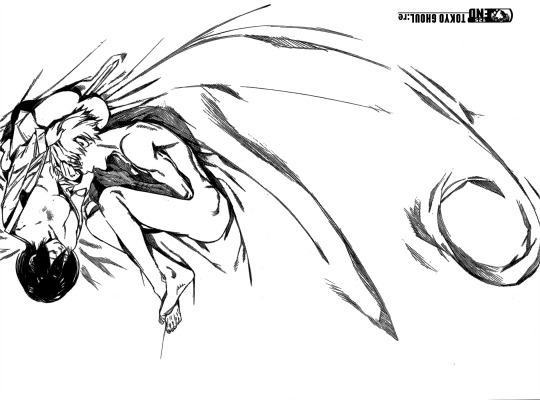
If you flip this number down it’s.... absolutely nothing. If you flip and reverse it, ie what would happen if you were to place it in a mirror than you get a backwards nineteen. If you just flip it it looks sort of like a 16 in the wrong order. If you take the numbers as individual, an upside down six can be the lovers in reverse while an upside down 1 could represent Hide as he was just mentioned in the last chapter. They could also not even be numbers but representative of a moth’s wings instead. They could also be moths wings as depicted at the beginning of the chapter.
They could also just be a pun on the word orgasm [x] with japanese numbers. My point is things can have many possible interpretations so try not to refute the assertions I make in this post with ‘that’s a nineteen’ or ‘that’s representative of the sun’. Anyway, continuing forward read under the cut for the explanation and yes I actually do get to Tsukiyama.
Generally if you want to put a tarot number in this manga in reverse it’s been upside down. Not reversed and then mirrored, that’s not really anything to do with tarot that’s just... da vinci mirror code.
The sun in reverse sort of relates to this situation:
The Sun reversed indicates that finding the positive aspects to a particular situation may prove to be difficult. The clouds may be blocking out the warmth, and preventing you from feeling as though everything is on track. You may have experienced setbacks that have damaged your enthusiasm and optimism and have perhaps led you to question whether you can really achieve what you have set out to achieve.
However I find it too positive, and as usual I sure do love being negative about things. It doesn’t make sense to me, the sun being in reverse would indicate that the moon arc is ending, but having sex doesn’t really resolve any of Kaneki or Touka’s issues. Sex isn’t really a net positive or a net negative, it’s just neutral.
Nonetheless, the Sun is never a negative card, so this is only temporary. The obstacles you see can be easily removed if you put your mind to it. It may just take a little more effort than usual.
Having sex, or advancing their relationship might solve their relationship arc, but it’s tangential to their individual character arcs. The sun is too much of a net positive here for me to see it as appropriate. For imagery reasons, Kaneki crying and then sitting in Touka’s lap could be a connection to the naked baby on the sun that is in itself a symbol of rebirth.
The child playing joyfully in the foreground represents the happiness of our inner spirit when we are in tune with our truest Self. He is naked, having nothing to hide
Kaneki isn’t really experiencing a happiness of his inner spirit though, considering he started crying in the middle of sex and could not explain why. This isn’t to say that Kaneki felt worse after having sex with Touka of course, but that the act of having sex with Touka doesn’t really have much to do with finding commune in his inner spirit. He literally, couldn’t explain why he was crying. The line “Why, indeed?” is a parallel to when he could not explain why he was crying to Touka.
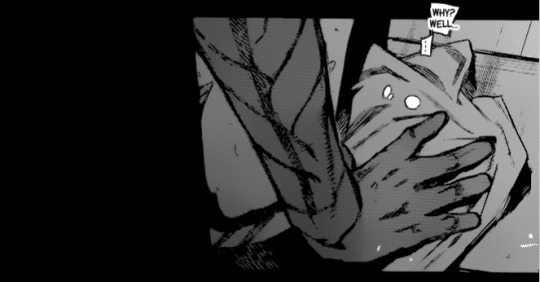
There’s also the fact that they’re having this sex in the darkness, with black borders around the panels and constant cut to black. I hope this makes a good case for why I think the sun isn’t exactly the perfect fit for this scene. The sun in reverse doesn’t indicate darkness, or the moon, it’s still the sun just in reverse. That leaves two more possible tarot interpretations, the lovers and the tower both in reverse.
The lovers reversed indicates that you are avoiding responsibility for the consequences of your own actions. You have made a rushed decision based purely on your desire for instant gratification and now you are trying to lay the blame on others or on fate.
The lovers can also indicate inner conflicts being at war with external forces. It suggests disharmony and difficulty in being able to balance your own inner union. The lovers reversed may also reflect that feelings within a relationship are not mutual. One person in the partnership might have stronger feelings than the other, and may be more emotionally involved.
This is closer, Touka and Kaneki are basically ignoring the whole outside world to have sex right now. The timing is pretty spectacular considering they’re both on the run from the law, and they’re not really Bonnie and Clyde. There’s also allies they have to meet up with, and the Oggai are a real pressing threat for every ghoul that the two of them claim to be fighting for.
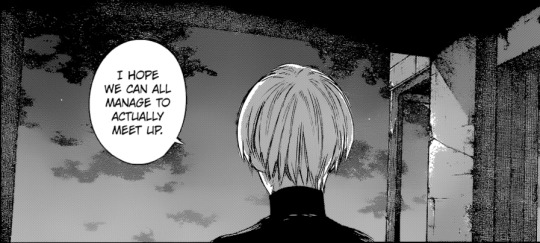
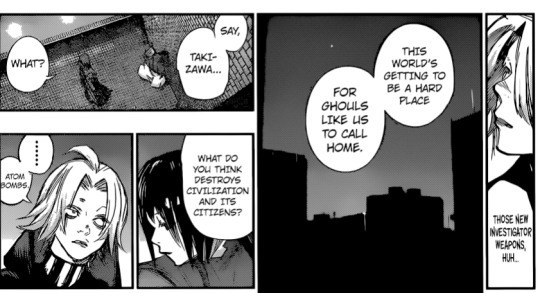
A real and pressing danger which outsiders like Takizawa seem to acknowledge but neither Touka nor Kaneki really do. Which is in line with both of their characters as they’ve always fought for personal relationships rather than the big picture affecting all ghouls. The problem with taking a siesta to boink therefore being that Touka and Kaneki’s lives no longer belong solely to themselves. They themselves have made the choice to accept the responsibilty of this revolution, and it’s not something that only Kaneki wants, but also something that Touka wants to fight for.
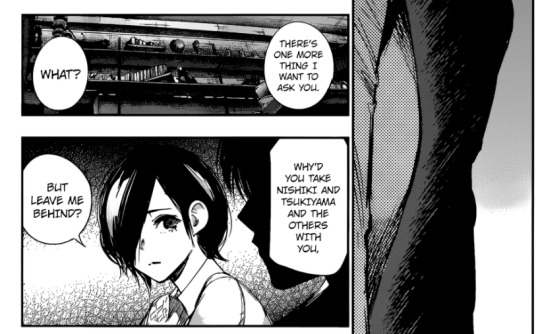
Ayato makes the point that they’ve all chosen to make everyone rely on them, so to go back now and act on personal feelings like their life solely belongs to them at this point is betraying that choice. In Ayato’s words it makes them half assed, because it means they care less about their committment than they presented themselves as having done so.

Which is part of why Kaneki’s flaws seem so much more stagnant in Tokyo Ghoul Re: than original Tokyo Ghoul. Tokyo Ghoul was Kaneki’s story through and through, it was the tragedy of how he failed to change in time to survive in the ghoul world. Re: is the story of a king, a king’s story is not as personal by its nature because it has ramifications that affect the entire world.
Therefore yes, Kaneki and Touka’s decision to have sex is an ignoring of consequences just for the simple logical reason of rendering themselves vulnerable right now while they’re being sniffed out by the oggai, if both of them were to die then the revolution would be snuffed out before it could ever truly have begun. It’s also okay to judge them for this because Touka and Kaneki both want to be important figures in this fight. It’s different than two people just trying to have sex on their own time.
Inner feelings being at war with the outside world... that’s obviously the moon arc so no need to dwell on that. The final part is interesting though, it indicates that one may not love another as much as the other. Now to get this out of the way, of course I think their affections are mutual to an extent. You have to be blind to not acknowledge that Touken is canon by this point.
In this case though, I actually think Kaneki’s feelings might be stronger than Touka. At least when you look at the way that Kaneki uses people he is close to.
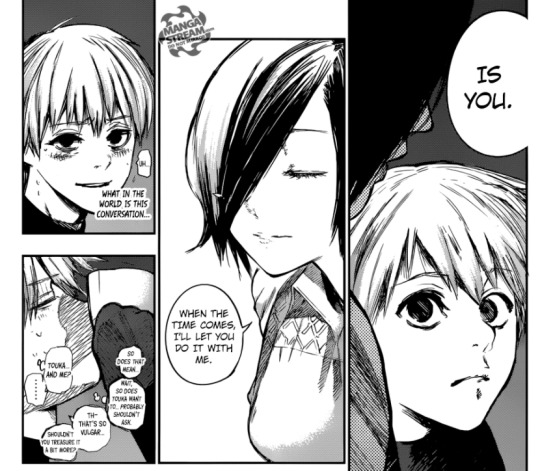
You look like you’re about to die. Between the two of us, the only one who thinks it was okay for you to just up and leave.... was you.
Touka says it outright, she would be willing to have sex with him to prevent him from wanting to go off and die. Kaneki says it indirectly a few chapters earlier.
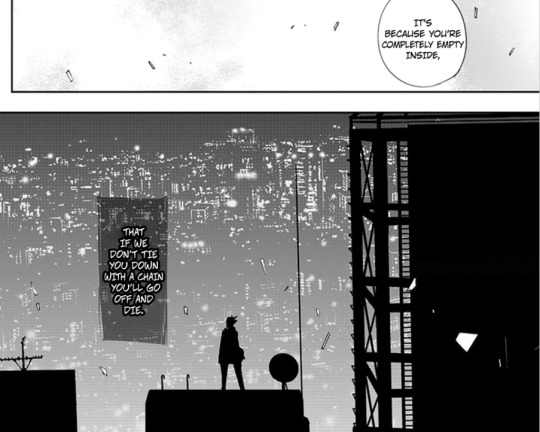
Kaneki wants somebody to attach himself to, and Touka wants to be that person of attachment. It’s a reaction in opposite directions to the same basic problem, they’re both afraid of people leaving them. In a way it’s an unequal love because Touka can never value Kaneki the way Kaneki wants to use her, as a reason to live, as a symbol for all the good things that make life worth living.
There are criticisms of Touka’s character that she bases herself entirely around Kaneki’s actions and what will make Kaneki stay around, or what is good for Kaneki’s well being but tha’ts not entirely true. A more nuanced view is that Touka since losing everybody at the Anteiku Raid, has shifted her priorities to try to ensure that her loved ones stay near her. Kaneki is just the crux of this issue, the symbol of all the important loved ones who left her, he himself inserted himself into that position by making that promise.
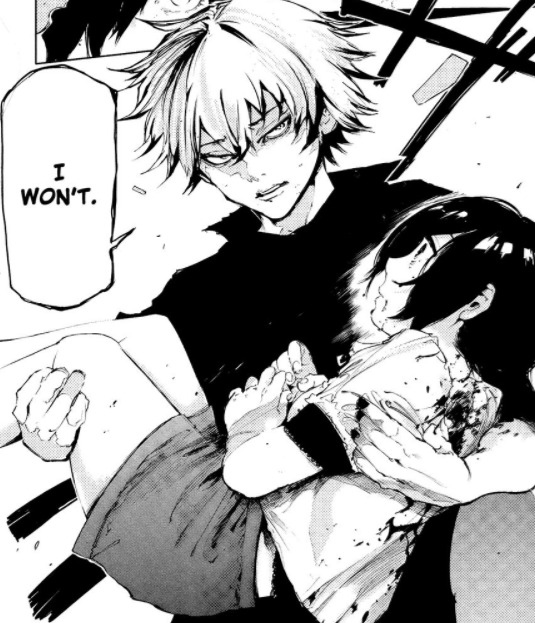
“Don’t leave me alone.”
That being said, defining yourself entirely by the relationships you have in your life and trying to keep them around is in and of itself a flaw. That is unless you think Touka has some secret agenda she has been running entirely offscreen when it comes to managing Re:, but even in that case we haven’t been presented any of that onscreen so until it gets focused on in the narrative it might as well not exist.
So we have two characters with flaws that render their love unequal, Touka wants to be a point of attachment and Kaneki wants someone to attach himself too. Just because the way in which they are codependent weirdly complements one another however =/= a healthy relationship. However since we are in the arc of people finding refuge in one another and using that as an excuse to hide from the truth, it’s understandable why the characters would make this mistake. Touken is a bit of a sad and tragic relationship, it’s always been. At it’s core it’s a struggle of people from two different worlds trying desperately to connect.
The snake in the fruit-laden tree behind the woman suggests the story of Adam and Eve, the fall of humanity from grace, and the temptations of the world.
The couple in the garden also have strong connections to the story of genesis. Something Touka and Kaneki parallel heavily right now. Think of it, Re: and Anteiku before it was a place where both of them were sheltered and allowed to be mostly innocent to the world. To them it was like a paradise. Both times it was completely destroyed and they were ejected from it however. When Adam and Eve lose their innocence they look at each other naked for the first time and begin to make love.
The story of Adam and Eve is much like one of Touka and Kaneki, a fall from innocence but at the same time they gain knowledge of right and wrong and self actualization. At some point theoretically the idea is that Touka and Kaneki will decide for themselves what they view as right and wrong, rather than following simply what Yoshimura or Arima told them, or endlessly substituting new parental figures to guide them.
Another clear parallel is that Kaneki and Touka are placing themselves as male and female figureheads of a new revolution. Ignoring the pregnancy thing, if Kaneki and Touka were to succeed in their revolution they would be the figurative parents of an entirely new world, one where their descendants both humans and ghouls would be able to coexist.
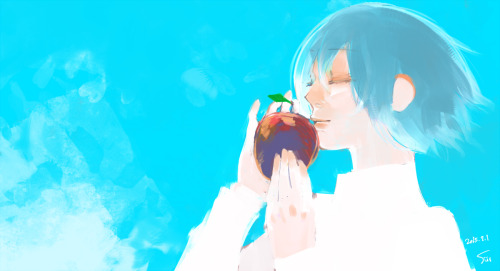
Touka is pictured with the apple several times, but different from Eto and Furuta who are both tempters offering the apples to others, it is Touka who bites in making her the eve in this situation. The manga has already given us a good summary of Eve’s actions, and her reason for biting into that apple.
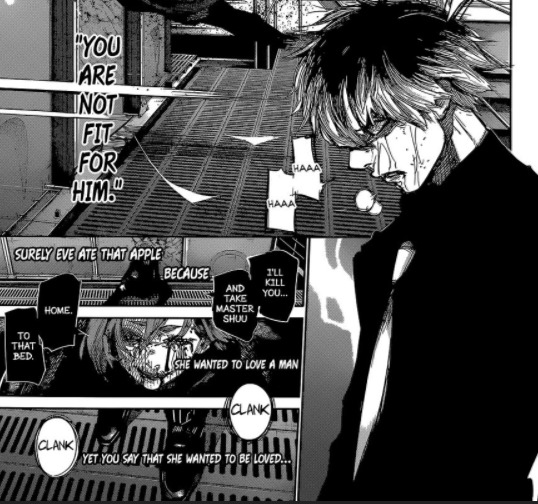
Sound like Touka and Kaneki at all? Surely she did that because she wanted to love a man, yet you say she wanted to be loved. It’s a good summary of their relationship and the tragedy of Touka’s own self conflicting selflessness.
Which is finally where I can start talking about what I think the most accurate tarot number to be read from that imprint in the bedsheets is, the 16 in reverse or the Tower. At first these situations seem only superficially connected to the tower arc, but allow me to make my case on how all the dangling plot threads from the tower are finally going to come to roost this next arc.
First off, the meaning of the tower in reverse compliments the moon arc well:
Upright, the Tower indicates a time of great turmoil and destruction, which will eventually bring with it change and regeneration.
Reversed, however, the Tower card indicates that you are simply delaying the necessary ‘destruction’. You need to go through this difficult time in order to learn an important lesson. Do not resist it. Even though it is shocking and hard to deal with, it is a very important part of your life journey.
Similarly, the Tower reversed suggests that, while you consciously want change and transformation, you seem to be afraid of these two things. You may feel that change and transformation may bring with it destruction and pain, and thus you are resisting this.
Characters consciously wanting to change but being unable to do so is basically the theme of the past ten chapters.

Every character has had their moment to show how they haven’t changed at the core despite everything they have gone through, because to them change is too painful a thing to face head on, and now we are finally getting to the lowest point of that with Kaneki and Touka. That’s not to say sex is a bad thing, but it is very primal in a jungian sense. There’s almost no better metaphor for characters acting on their most basic desires, no wonder both Jung and Freud lenses are so sex obsesed.
In seeking comfort in each other, both of them prioritizing their fear of loss over their duties and the change they want to make to themselves and the outside world Kaneki and Touka both stagnate the necessary change they need to go through. The tower is a scary card yes, but it’s also an optimistic one. People have a tendency to dwell on the loss, but after loss comes rebirth. That’s the entire point of Kaneki’s supposed goal of breaking the egg and transforming the world, but he himself shies away from it.
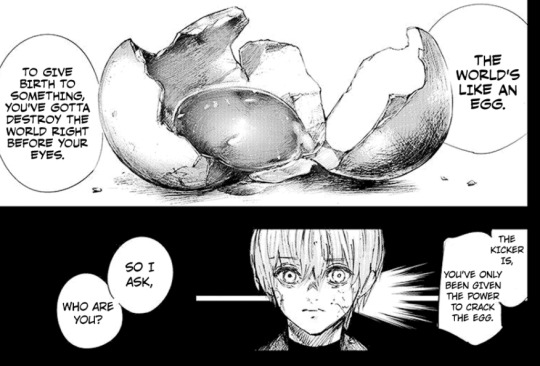
Just like in the lover’s card, it’s also specifically a man and woman who are falling. Quite morbidly you could say this is the result of their sudden spiritual awakening, the two of them are thrown off the tower together and lose control upsetting all our old notions about the relations between subconscious and self consciousness.
If it’s truly invoking the tower here, then this connects back to an old scene in :RE. That time when Kanae and Tsukiyama were experiencing their own version of the Tower as they attempted to find enlightenment of themselves in the clumsiest and most disastrous way physically possible.
1) The building that the final Tuskiyama Raid took place in was called the Lunar Eclipse
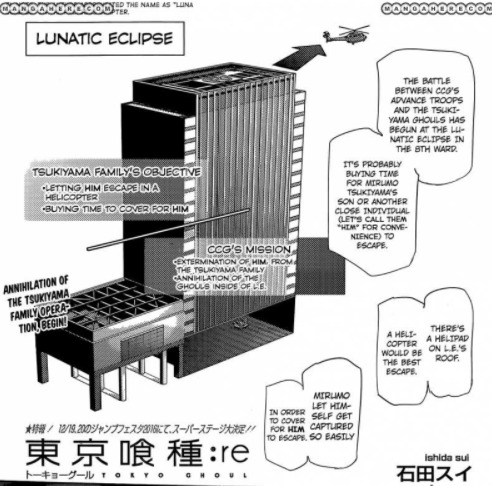
(Imperial scans translated it weird, it’s supposed to be Luna Eclipse).
2) It’s the first place where Furuta showed his true nature as a moon character
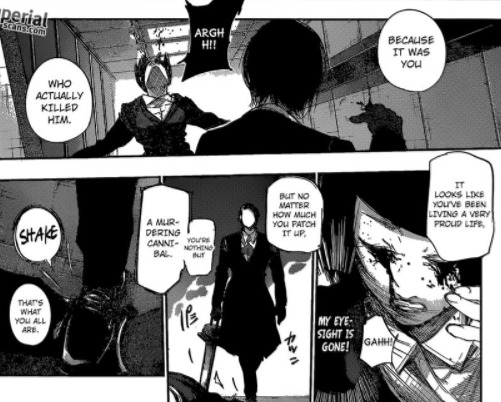
Furuta as a character is one who exists to bring about an eclipse and invoke the moon card. At the moment he stands as the biggest obstacle in the background to the characters own enlightenment while at the same time encouraging them to indulge in their own shadows. He’s also been physically invoked with the moon before.
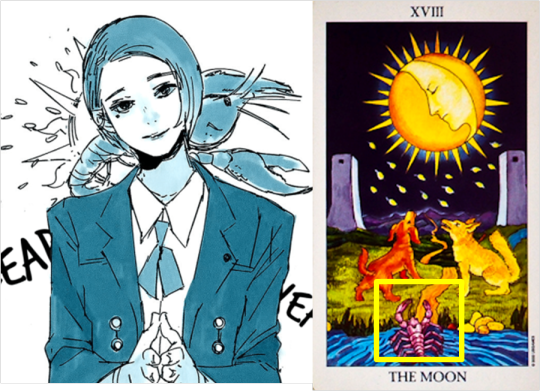
3) It set up the major incidents of trauma that are driving key character’s right now, namely Urie’s loss of Shirazu, Haise’s leaving of the Q’s, and Ui’s loss of Hairu.
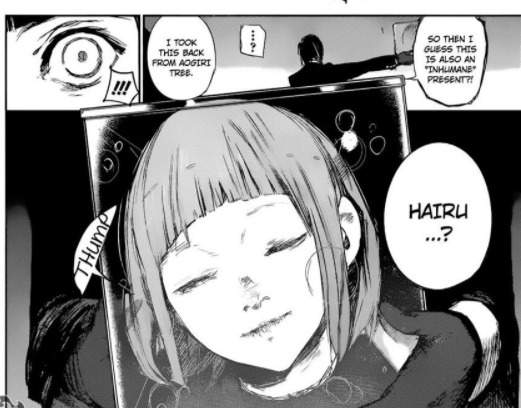
Furuta calling back to Hairu’s loss is a deliberate callback to that time, and I believe he’ll repeat this temptation again and again for the point I am about to make later. Let’s continue with listing these parallels though.
4) It’s the last time Tsukiyama had an arc in regards to his family, and Karren’s final words to Tsukiyama are the same kind of emotional openness that Touka and Kaneki are experiencing now.
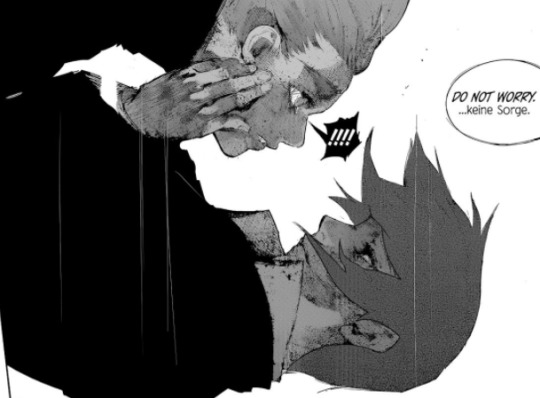
The same way that Touka and Kaneki are now falling off the tower, Kanae and Tsukiyama were in their own arc. However they are not given the same resolution that Kaneki and Touka were, mainly because of one active interfering participant.
Which is ironically enough, Kaneki himself is the direct reason why Kanae died before either of them could get proper closure or growth to finish off the great conflict between the two of them. Kaneki made a deliberate choice to sacrifice Kanae at Tsukiyama’s expense, one that he has yet to face any consequences for in the narrative.
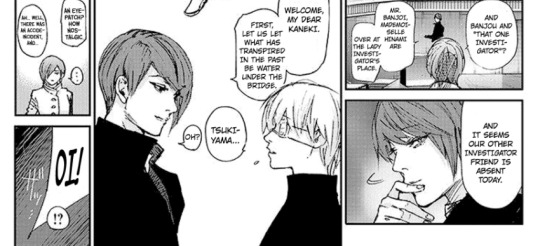
Clearly there are a lot of loose ends both emotionally and plot and character wise from the tower arc, and this arc is the continuation of them. Which is why from this point forward this post will be dedicated to where I think Tsukiyama’s arc will lead him next and why it is going to be an important continuation of his character arc which has been left in suspension since the raid arc.
As to the image above, Tsukiyama just deciding to forgive Kaneki before he even apologizes is obviously not the proper way to resolve a conflict. If anything it avoids conflict so Tsukyiama can pretend everything is as it always was. This is what he thought he wanted after all, a false return to those days when he was a member of Kaneki’s kru.
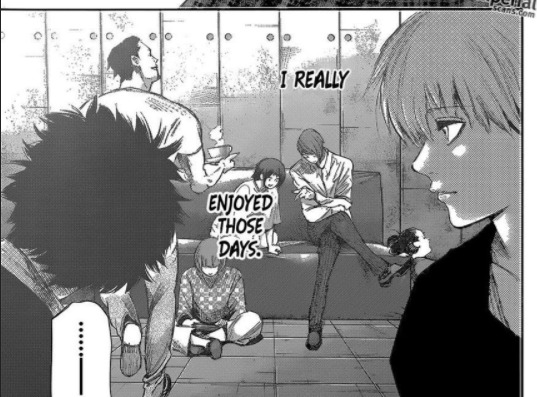
In a way it’s what he always wanted, but Tsukiyama is not satisfied from what we see in the omake. We already know he dislikes being treated as a wallet, to the point where he gets jealous over somebody who Kaneki basically treats like a servant.
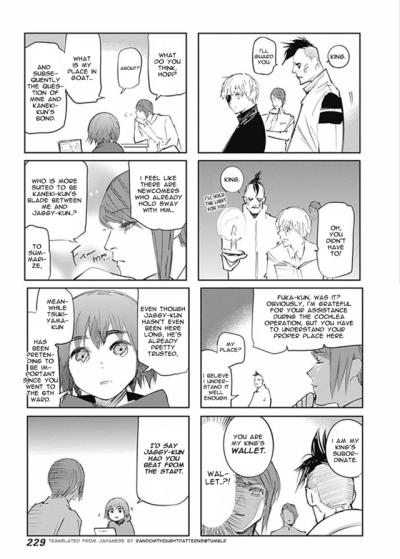
Chie has a point though, the way that Tsukiyama views relationships si that he can simply just be important without putting any of the actual work in. It worked with Chie because Chie doesn’t really care, she has a fondness for Tsukiyama yes but she’s not driven by closeness or loneliness the same way Kaneki is. Kaneki is difficult as a person to navigate, but Tsukiyama then doesn’t really see him as a person to begin with which is a major reason that stops them from getting close.
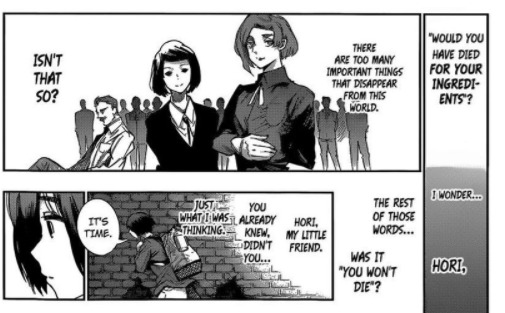
It’s from the start of their relationship, Tsukiyama refers to Kaneki as his gourmet food which belongs only to him. Chie acknowledges that part of Tsukiyama doesn’t really feel that way but there is a distinct difference between Tsukiyama’s conscious and subconscious minds.
In other words he’s an excellent example of a moon character. He has, all of the symptoms of the moon that others characters are exhibiting in this arc. His main method of satiating himself is obsession and pursuit of aesthetic reasons to live when in reality he’s quite emotiionally distant and lonely. Most of his actions are in trying to satiate those actions by, in a nihilistic way, moving from obsession to obsession. Chie even comments on this.
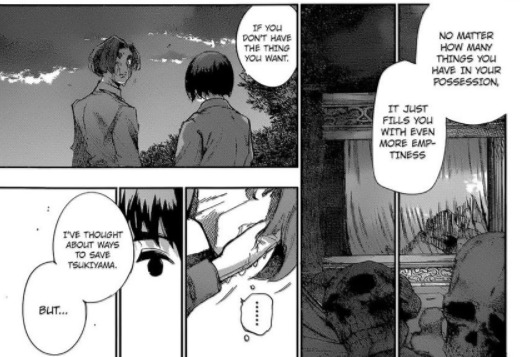
Which is what makes his connection to the only other moon character, Furuta, even stronger.
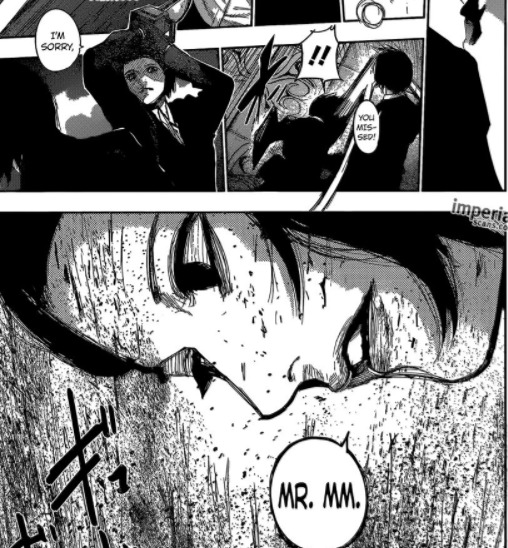
Furuta even drops him by name, which is a pretty major signal that the two of them are going to have a connection at some point. After all our first introduction to Furuta is when Tsukiyama brought Kaneki to the gourmet club.
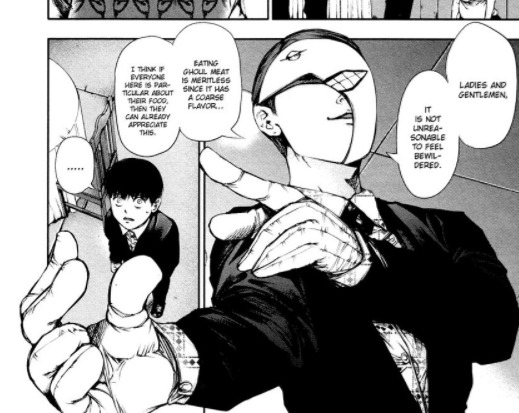
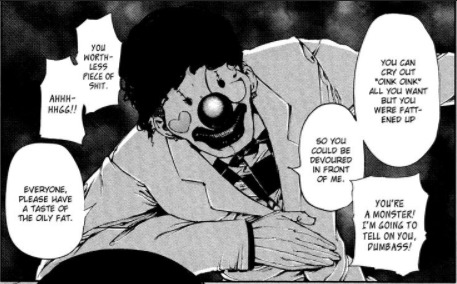
The way they present themselves is even similiar. Early Shuu Tsukiyama is close to a clown in motivation, where he only seems to care about living life for the pursuit of aesthetic desire rather than forming substantive relationships. We later learn that’s not the case but it’s also Shuu himself who has to learn this lesson. Also talk about unsubtle, there’s a moon directly drawn on his face.
While Furuta/Souta are introduced similiarly, most of the details of their character deliberately contrast each other to set up a foil.
Furuta is actually quite good and intelligent at shutting down his emotions and only ever wearing masks, and Shuu is the opposite, he thinks eh’s only reacting to the aesthetics and passion for food but actually he ahs real emotional issues that are super uncontrolled and also transparent.
They both quite clearly deviate from the actual clown mentality in different directions. Shuu’s “I care about the aesthetics” is a lie he’s convinced himself of because he can’t process his own emotions.
Furuta’s clownish nature is a kind of repression and a really bleak coping mechanism for being born into a tragic life. They’re both at removing themselves from their emotions, but Shuu genuinely believes it and Furuta knows it’s a sham.
These two are both moon characters, they experience emotions they athey don’t understand but just assume they are about aesthetics and comedy because that’s the only framework they can deal with their actual emotions. Tsukiyama even pretends his attachments to people are purely aesthetic when they are so obviously not.
There’s also situation parallels, they were both born to families that have a great deal of influence over the ghoul world. The Tsukiyama’s however primarily use their influence to give other ghoul’s a place in society, while the Washuu stomp out ghouls from society. Tsukiyama himself is an unwitting heir like Matsuri who cares more about personal freedom than his responsibility, while Furuta is closer to Karren a cousin who is instead treated like a servant to the family and loses their sense of personhood because of it.
Even their birthday poems are total and complete opposites. Shuu’s is one of calm reassurance that life is going to work out okay, while Furuta’s is telling you to laugh because the world is awful and then you die.
Then the question is, if Shuu is a character heavily associated with the moon why has he done absolutely nothing this arc of note so far? My answer is that Ishida likes to play with his cards close to his chest, but there are a couple of hints as to what might happen next.
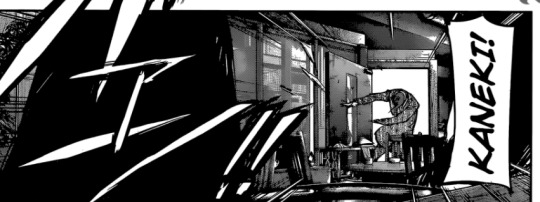
I think it’s important that Shuu was the one to interrupt the initial Touken talk, and also he does so with news o the real world, that thing that Kaneki and Touka oh so conveniently avoid a lot.
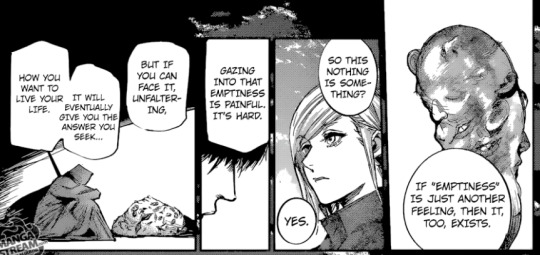
This was also shown a few chapters ago, a clear and obvious “Behlit” and in the same chapter a deal with the devil happens.
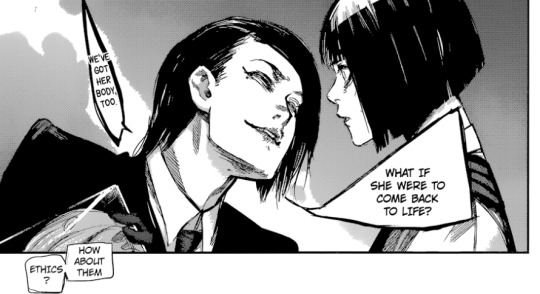
If you take this entire brewing arc as a parallel to Berserk, a certain scenario can be mapped out. In Berserk Bejlits are stone fetishes of unknwon supernatural origin said to govern the fate of humanity. They are primarily used for summoning the angels of the God Hand, at which point the owners are granted a wish in exchange for a sacrificed.
The most major activation of a Behlit we see in Berserk, is one where Griffith chooses to sacrifice his comrades in order to pursue his goal of being king. The strongest parallel we have right now is that in Berserk the main characters Guts and Casca, finally connected and had sex right before the Eclipse happened.
This is just going to be summarizing Berserk for a second so let me just, Kaneki and Guts have several parallels that can be drawn between each other. In particular Guts tastes happiness for the first time in the band of the hawk and then leaves it because he is unsure of himself. This is a repeating thing with Guts several times, he’s unable to grasp happiness because he’s generally lived a miserable life up until this point and is afraid of losing him.
Gut’s abandonment of the hawks sends Griffith into a downward spiral which culminated in him becoming an emaciated husk of his former self (Tsukiyama) and having his tongue cut off (Kanae). What drives Griffith over the absolute edge though is overhearing Casca and Guts make plans to leave Griffith eventually and start a family of their own. Hearing Casca and Guts act of their own free will especially when Griffith is so close to losing everything impacts him greatly because he viewed them as objects that belonged to him, so them leaving is the final nail in the coffin of his own downfall. Griffith attempts suicide.
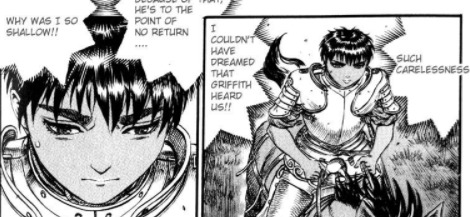
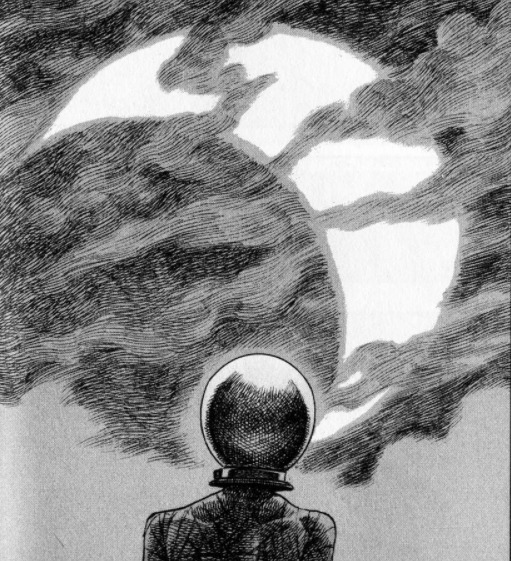
When they rush to find him though, they encounter the eclipse. Which is when the godhand descend and slaughter the band of the hawk. I don’t think an exact parallel of this is going to happen in TG of course, but there are parallels that can be drawn between the main character.
Tsukiyama in the past has seen both Kaneki and Touka as objects of interest, and any emotional attachment to them has always been framed in this lens. Rather than a love triangle, their decision to confide in each other to that extent could be what pushes Tsukiyama to the edge. Especially when he wants to be close to Kaneki and seen as more than a wallet. A solar eclipse is also what is happening metaphorically in the manga, when the moon blocks out the sun and the characters lose all of their insight causing their shadows to grow even deeper.
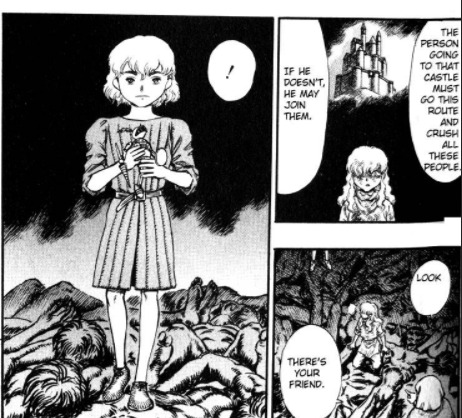
Griffith of course is a character who is willing to stand atop a pile of corpses and climb their in order to become king. The same blind and destructive ambition is reflected in Furuta as he climbs to the head of the Washuu family and declares himself Washuu king, building his pathway there on the bodies of dead ghouls and humans alike.
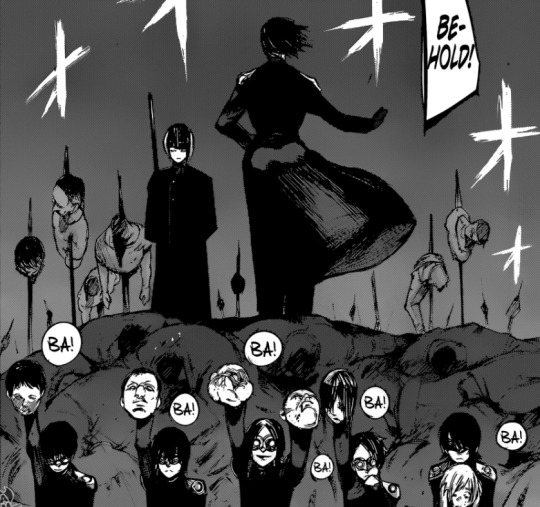
In this case Griffith the betrayer can be represented in two persons, Tsukiyama for his complex emotional relationship that exists on the outside of Touka and Kaneki’s own relationship, and then Furuta who propels forward with blind ambition. Tsukiyama is also defined by his selfishness in his own relationships as Touka points out.
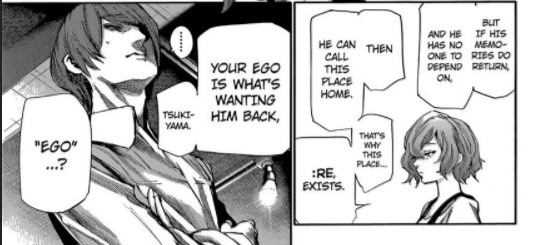
(Just leave the other aspects of Griffith’s character aside for now).
Therefore if Tsukiyama and Furuta were to ever come together, a disaster and a betrayal quite like the eclipse is likely to happen. We know three things about Tsukiyama’s character arc going forward, one that his character arc should have him letting go of the idea of Kaneki he clings so tightly onto.
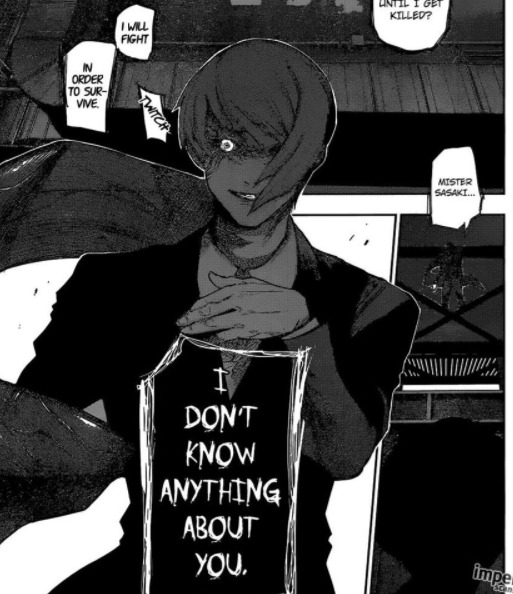
In his great moment of character development he even rejects Kaneki and fights against him. If Shuu is ever able to move forward he first must let go of this idea of Kaneki in his head.
Second he has yet to properly mourn Kanae. Part of the reason why is because after they died, he was immediately told that Kaneki did so for his sake which must have complicated his feelings on the matter. Repressed feelings are never a true way of dealing with them though, so Kaneki’s direct hand in Kanae’s death is something that should boil to the surface sooner or later. Especially considering the unacknowledged hypocrisy that Kaneki is a once Dove who slaughtered ghouls en masse now claiming to fight for them.
This could also tie into Furuta’s way of tempting Tsukyiama away from Kaneki. If he still has Hairu’s body, then it’s likely he could still have Kanae’s as well. Kanae’s even already had Noro’s kagune inserted into them. Furuta could offer Kanae’s revival as a way of bringing Tsukiyama over to his side, especially if the alternative is working with somebody who doesn’t regret much less care about killing Kanae.
Third and most important is that Tsukiyama is basically Kaneki’s second in command at this point. If there was anybody who could bring a devastating fissure to the group spiderweb of delicate bonds which holds Goat together at this point it is him. He acts as defacto leader when Kaneki is gone, is in control of gathering assets for them, and even knows the codes.
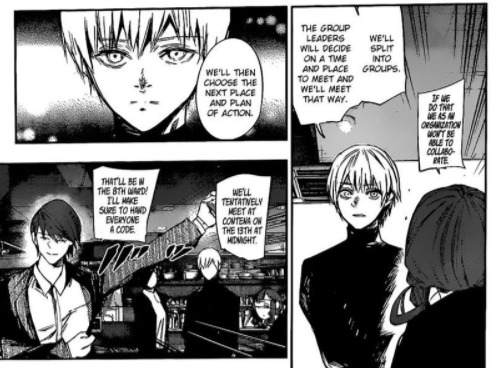
There is no better point of infiltration than Tsukiyama, and also considering that Tsukiyama saved both Naki and MIza’s life, and has a close relationship with Hinami he might even be able to take a few key members with him. Hinami I think is most important because like any youth she needs some form of rebellion against Kaneki, because watching her repress all of her emotions for Kaneki’s sake is just getting painful at this point.
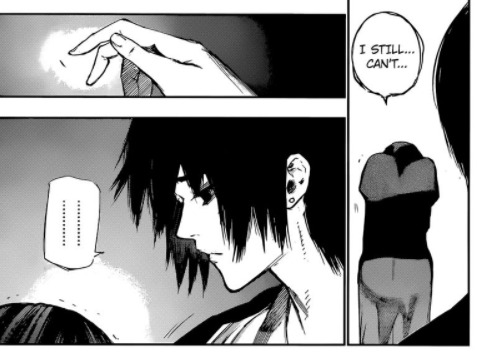
Notice how, quite predictably her and Akira’s supposed reunion had no emotional growth for Hinami or acknowledging of Hinami’s feelings and centered entirely around Akira. It’s almost like Hinami’s too selfless for her own good or something. Her time in Aogiri, her decision to join them was pretty critical for her move to grow up and towards her own independence but now she’s back to attaching herself to Kaneki again.
There you have it, my long and far fetched guess of how Tsukiyama will factor into the moon arc and also the big explosion that might finally get these characters motivated.
#tg meta#meta#tsukiyama shuu#Furuta nimura#touka kirishima#kaneki ken#tarot#tokyo ghoul theory#tokyo ghoul meta#tokyo ghoul re
280 notes
·
View notes
Text
The Blair Witch Project to Skyman: How Director Daniel Myrick Came Full Circle With His New Sci-Fi
https://ift.tt/2CyBT8K
“Blair Witch, which I consider incredibly fortunate to have been a part of, does come with its own set of baggage,” says Daniel Myrick, one half of the duo who made the found footage phenomenon which scared the hell out of audiences when it was released in cinemas in 1999 and went on to change the face of horror as we know it.
We’re chatting (via Zoom) in the context of Myrick’s new movie, Skyman, a documentary style sci-fi which feels like it could be real, featuring elements of found footage and starring relative unknowns Michael Selle and Nicolette Sweeney, who play Carl Merriweather and his sister Gina. Carl believes he encountered an alien when he was just 10 years old and he’s convinced the being he calls the ‘Skyman’ is going to return for him on his 40th birthday. Along with a documentary film crew, Carl, his sister, and their friend Marcus (Faleolo Alailima) venture to the tricked out shelter in the desert where the encounter took place all those decades ago.
It’s easy to see parallels between Skyman and The Blair Witch Project – both are low budget, with a small cast, shot on location and in documentary style. It was something that Myrick was very aware of when he was developing the script.
“Even though I felt intrinsically drawn to the documentary form for Skyman I was very conscious of people making direct comparisons to Blair,” he says.
“I have three versions of the script. I’ve got one that’s a straight-up scripted narrative, I’ve got another version that is a complete found footage version, where it’s just all Carl’s found footage. And then I’ve got the one I ultimately shot, which is sort of an Errol Morris-style documentary following a character, and drawing my own conclusions, both consciously and subconsciously with the way I put the film together.”
Similarities aside, Skyman is tonally very different. Though the marketing material positions this squarely as hard science fiction the end result is more like a sympathetic character study.
“I wanted to look into the life of a lot of these ‘experiencers’ and people that we would normally write off and maybe dismiss at first glance,” says Myrick. “Carl, I think, represents a subculture of experiencers that, even if you don’t believe what they say is real, they believe it, and it has a huge impact on their lives and their families’ lives. I thought it was a different take on the UFO genre and not necessarily a procedural or whether they’re real or not that we’ve seen a million times. I wanted to take more of a character approach to it.”
Read more
Movies
The Best Creepy Horror Movies
By Sarah Dobbs and 1 other
Movies
Best Sci-Fi Movies on Netflix Right Now
By Alec Bojalad
Skyman is a portrait of Carl. He’s a bit of an outsider. He’s a smart guy who can fix things but he’s also a little bit odd. He sincerely believes aliens made contact when he was just a child but it’s clear Carl is haunted not just by this experience but by the passing of his and Gina’s father and the stress of trying to connect with and support their mother who is now in a care home.
Myrick knew what he was looking for – or rather what he definitely didn’t want – when he held open auditions for the role of Carl – a part which would make or break the film.
“What I wanted to avoid is the typical or stereotypical wacko that you see oftentimes portrayed as UFO experiencers,” he says. “What I thought was important is that you had to like Carl. Whether you believed in him or not, you had to like him, you had to find him somewhat endearing. He has a little bit of Asperger’s going on so I needed an actor that could play that and all his subtleties and not come off as an over-the-top Rain Man in that.”
Selle nails it, as does Sweeney as the fierce, funny, sister who teases Carl but loves him and sees him clearer than anyone. While Skyman, like Blair Witch, is a journey of three people into the unknown, rather than venturing deeper into a feral, folk horror forest until they are impossibly lost, Carl, Gina and Marcus travel to the wide open spaces of the desert, a place which is, as Myrick rather beautifully puts it, “a vast openness blanketed by stars that are so vivid, you can almost reach out and touch them.”
It’s a very spiritual place for many people, he explains. Myrick seems particularly interested in spirituality, or rather belief, whether that’s in UFOs, ghosts, religion, myth, or anything else – our need to believe there is something more than us out there.
When Myrick was a kid he had a UFO club with his friends where they would research ufology, Roswell, Area 51 and the like. It was around the time when Close Encounters of the Third Kind came out, “so it really tapped into my imagination as a kid – I wanted to ride on a spaceship!” he laughs.
“But as time moves on you start to become more realistic about whether or not there’s little green men living in your backyard,” Myrick says. He’s certainly not ruling out the possibility of intelligent life on other planets but he says what fascinates him more is why people are drawn to it.
“What is it about this subculture and the similarities between the need for explanation in ufology and the need for explanation in religion? There’s a lot of overlap there. We also have to be careful as individuals not to come in with too much preconception of someone we see. It’s easy to polarize and cast generalities on people.”
There’s no more polarizing moment in Skyman than when Carl’s journey takes him to a UFO convention, in search of the truth but also to meet like minded people. These scenes were shot at a real UFO convention and Myrick tells us that in some of these sequences it was just Selle and Myrick and the camera, really getting a sense of intimacy against the backdrop of the busy carnival-like celebrations.
“I wanted to get across that Carl isn’t the festival type of guy. He’s not there to check the parade out or enter the alien costume contest. He’s there to really seek answers,” Myrick explains. While Carl’s there he’s mockingly interviewed for a blog and declares that it’s good to know that he’s not alone, in a sequence where to the viewer he’s never looked more alone.
“Going with unknown actors and taking this approach to it, I felt made the film more intimate and more sincere,” explains Myrick, and he’s right – like with Blair Witch, the subtle and completely convincing performances are what gives the film such pathos.
When The Blair Witch Project arrived, premiering at Sundance, the marketing material tried to convince audiences that Heather, Mike, and Josh really were missing. The actors had to genuinely pretend to be dead. While Skyman definitely has a real life vibe there’s no serious pretence that it’s actually real. In fact it’s debatable whether another Blair Witch could ever really exist in this day and age.
“I mean, I never say never,” says Myrick when we pose this. “Paranormal Activity came out 10 years later and blew everybody away, which was its own phenomenon arguably.” Paranormal Activity certainly started its own found footage boom and deserves a spot in the horror pantheon but whether it’s as culturally significant as Blair Witch is another matter.
Heather Donahue has certainly talked about the down side to her sudden shot to fame at the same time as having to play dead, but for Myrick, who was making his debut with Blair, there were different consequences.
“Yeah, it was quite the whirlwind. I think Ed Sanchez, who co-directed it with me, and I were … we were ill-prepared for how big it became. I mean, if you could pick a film that was smaller by design that ended up being bigger in the consciousness of the culture, you couldn’t find anything bigger than Blair Witch,” he recalls. “I remember joking with Ed. We were in a little crappy office in Orlando, and Blair Witch was really hitting its stride at the box office. And I had the box of these 12 little videotapes that were the raw footage of the movie. I said, ‘This is what this is all about. These stupid little videotapes.’”
12 little videotapes that changed the face of horror and the careers of Myrick and Sanchez almost overnight.
“We had hoped that we would make a movie that would be a calling card project,” he says. “When we got into Sundance, we thought we hit the motherlode and maybe we could get a project or another gig out of it. Our primary concern at the time was just to get the investors’ money back and move onto the next project.”
Read more
Movies
Blair Witch: Adam Wingard and Simon Barrett Talk about The New Sequel
By Edward Douglas
Games
Blair Witch game review: the dog is great, but the scares are lacking
By Bernard Boo
They ended up getting much more than that.
“Nobody anticipated how big it would become. I know at Sundance, we started getting an indication it was going to be pretty popular. The whirlwind started building there at Sundance in the industry. But it wasn’t until Cannes, I think, for me, that it became much bigger than ourselves, that suddenly it was international.”
Myrick recalls being on a panel at Cannes in the South of France, right on the beachfront, with Spike Lee and John Sayles in the same line up. “We were like, ‘What are we doing here? We have no idea,’” he laughs, saying that he and Sanchez spent a lot of time on planes for the next couple of years. They were the golden children of low budget, high impact horror, and that involved getting sent a lot of bad scripts.
“They wanted us to direct Exorcist 4, which I didn’t want to touch with a 10-foot pole,” Myrick says.
“Artisan, at the time, that bought Blair Witch, wanted us to do a sequel, and offered a lot of money for us to do it. Ed and I felt that it just was too soon, and we wanted some of the hype to die down for a couple of years and revisit some of the other ideas that we had on the Blair Witch mythology and explore some of the backstory. But Artisan had other plans.”
Blair Witch 2: Book of Shadows followed just a year later in 2000 with neither Myrick or Sanchez behind the camera. It was a meta-horror in a completely different style to the original which imagined fans of The Blair Witch Project, the movie, travelling to Burkittsville to investigate the story. Director Joe Berlinger was bought in – Berlinger would later make his name as a documentarian, mostly recently making excellent series The Ted Bundy Tapes, and less successful Bundy dramatization Extremely Evil, Shockingly Wicked and Vile. Book of Shadows had a much bigger budget and in no way replicated the success of the original, either critically or in terms of box office.
“The pressure’s very high to continue the money machine for Hollywood, and they don’t really care too much about your creative whims and what’s inspiring you and what you’re passionate about,” Myrick says.
“It’s one of those things that you get pigeonholed in, and it’s hard to get out of. Especially when they’re throwing money at you and saying, ‘Do this or that.’ It’s tough to say no when you’ve been broke most of your adult life, having to make these choices.”
Instead Myrick moved to Hollywood to forge his own path. Teamed with a couple of studio producers he struck a deal with Warner Home Video where he made six features back to back – movies he describes as Twilight Zone-esque.
“On paper, it’s like a great setup, where we had six films funded, and we write the stories ourselves, but they all had to fit within this kind of marketing box, that Warner DVD wanted us to be within. Naively, I thought ‘Oh, I can make that work, and I can get my vision on the screen’ but it was a rude awakening. You realize that you don’t even get to choose your own title of the film or what the poster looks like or how it gets marketed. They were successful efforts. There’s nothing against that period of time, but I also felt it was very restricting for me. I’m just not good when I don’t have control over my own destiny.”
The Blair Witch legacy wasn’t over then, and perhaps it’s not over yet. 2016 saw the surprise announcement that a mysterious Lionsgate horror called ‘The Woods’ was actually a direct sequel to The Blair Witch Project, entitled simply Blair Witch. Myrick was involved as executive producer and says it’s his favorite interpretation so far, because it doesn’t mess with the mythology of the original. Though the movie wasn’t especially successful Myrick isn’t ruling out a wider Blair Witch expanded universe – and even one he might want to be involved in more directly.
“I would love to do a black-and-white noir Rustin Parr period piece, which I think would be super-creepy,” he says. ‘It’s a bit of a risk, right? Lionsgate, who owns the rights now, would have to go, “All right, Dan, go do your black-and-white noir.’ But it would be cool. I don’t know a Blair Witch fan that I haven’t mentioned a black-and-white Rustin Parr story to, that doesn’t go, ‘Oh, man, I’d go check that out.’”
Oh man. We would go check that out.
More than 20 years on and Myrick has of course matured as a director but there are lessons he says he has learned back from his days on Blair Witch. Namely that a film taking on a life of its own is something to be celebrated and not fought.
“That is a big thing that I learned, especially through Blair Witch, which was an experiment in its own right and tossed out a lot of the rules we were taught in film school about how to direct and how to position the camera and lighting. All that got thrown out, so it really forced you to, in a way, un-direct – to allow the process to happen and recognize when it’s going right and when it’s going wrong, but not be your own worst enemy, trying to steer it too much.”
Perhaps this is part of the key to the special ‘realness’ that comes across in both The Blair Witch Project and Skyman, as different as the two might be. Whether you see similarities in the content and style, what definitely links the two is that they are personal and they are Myrick’s own, through and through. They are passion projects, and they are what he wants to make.
“I’ve just seen too many people in Hollywood, making a ton of money, absolutely miserable making movies, and I never wanted to be that person,” he says. “I would rather live more humbly and make smaller films and have a blast doing it, like we did with Skyman. I can die a happy man if that’s all I get to do.”
The post The Blair Witch Project to Skyman: How Director Daniel Myrick Came Full Circle With His New Sci-Fi appeared first on Den of Geek.
from Den of Geek https://ift.tt/3h2CqP3
0 notes